#so people decided that a culturally significant tragedy that gets talked about a lot by thespians is somehow the culprit
Text
((I love the people who tag my posts with "The Scottish Play." Like. Macbeth Macbeth Macbeth!!! The play Macbeth!!!! Macbeth by William Shakespeare!!!!! Macbeth (not the character)!!!! Get scared get scared get scared!!!!!!!!! Woe sandbag be upon ye!!!!!!!!!!!!!!
Anyway happy halloween y'all :) Hope you had a good time tonight))
#for the record i will never believe in the macbeth superstition#as someone who has worked in theater both onstage and backstage#things will go wrong no matter what. there are just so many people and moving parts that you cant avoid something going disastrously wrong#but it feels nice to have something you can tangibly blame when youre faced with a situation where nobody is at fault#so people decided that a culturally significant tragedy that gets talked about a lot by thespians is somehow the culprit#and the play itself is haunted oooooo#but. no. no matter how diligent everyone is about avoiding talking about macbeth someone is still gonna almost get a concussion mid act#props are still gonna go missing. set pieces are still gonna fall over. someones still gonna fall down the stairs (me lol).#allow yourself the freedom
132 notes
·
View notes
Text
Loke Talk and Many Many Tangents, Don't Look at Me
Thinking about Magister Jace Loke again. I seem to voice all the Thoughts I have about him and my Godwoken, Arboren, on Twitter of all places. But this is going to be longer because I'm feeling inclined to rambling and can't be bothered to edit myself. Also I'm spewing this on here because I don't want to have to see, in person, anyone roll their eyes or blatantly ignore me as I go on about my nonsense (fair) for the millionth time in a row. For clarity, I'm currently working on one of my many AU ideas in which Loke appears and encounters Arboren. Typically in my head that happens under similar circumstances as they do in game because I am a sucker for the whole 'fate, but in different realities so some things are the same, but some things are changed' trope. Probably because the general inevitability of it can be great grounds for either tragedy, or a certain bittersweet vibe, depending on my mood (I never truly write tragedies. There's enough of that to go around, and they may have their value, but I like my happy endings).
In my flower shop AU Loke works for a private paramilitary organization that is employed by a megalithic, religious corporation (most of them seem to end up that way at their worst, and I'm calling it what it is in this case for clarity) which is scrubbing the world for historic artifacts of magic significance. In the transport of one such magic artifact Loke suffers traumatic brain injury due to a concussive blast which damages optical functions (as it turns out, people rightly take issue with you pilfering historical and cultural artifacts from their homes). While he is in recovery (and waiting a larger surgery which should repair the damage) he misses the funerals of his fellow comrades and when he does finally get the chance to show his respects, he goes to purchase flowers as is customary. It is here he encounters Arboren. Arboren is running a flower shop called Good Intentions (homage to my angsty as all heck fanfic by the same name) and is a refugee in the city (I think I called it Port Joy because I have no shame), escaping from the destruction of his homelands which are being invaded by a terrorist state which unlawfully used chemical warfare in their assault upon said elven homelands. There's other stuff going on, like the fact that Arboren was charged with the care of the flower shop by an eccentric who has decided to retire and go wandering around the world and other places, that there is a shape shifting shop clerk called Q who helps out around the place, and endemic necromancy problem going on in the background etc etc, but that's the main of it as far as I have considered so far.
The AU I am working on right now is a mermaid AU because it's almost May and if you're on the internet at all you probably know that a lot of artists go wild about mermaids in May. Also for personal reasons I am spiritually bound to love ocean related things. I've officially called it Good Intentions: Sword and Scale. And I say officially because I've gone off the deep end (heh) and started to draw it as a SHORT comic. I'm hoping to being posting in what I am startled and alarmed to find is only 40 days. I'll probably go into more detail about the plan for that as the time approaches (its not a big deal or as serious as I make it sound, its literally just a fan comic, I'm just nervous and excited and get even more verbose than usual when I am). Loke finds himself aboard a vessel, returning home as a member of an army which has concluded a crusade and is laden down with all sorts of spoils of war, including a particularly rare and powerful gemstone (I imagine you can see the through line here). Unfortunately, what none aboard the ship are aware is that the stone was kept on land for a reason, and by bringing it out to open waters once again they unwittingly awaken an ancient sea creature. I won't go into too much detail, since I want to save that for the comic (lower your expectations--I'm working very hard to keep this comic thing Short. Literally, my goal is for it to be done by the time May ends), but the plot is pretty basic: mermaid encounters victim of ship wreck and decides to be nosey.
I've gone on a mega ramble here, given that my original intention was to say that I was reviewing Loke's dialogue (thank you awonderfulaverage) and it got me thinking about the Thing With Loke. The thing with Loke is actually a lot of things and I won't even guarantee that I'm going to be concise, or wholly accurate (my brain refuses to differentiate between canon and fan fiction and also just that one errant thought you had while standing in line at the grocery store or something idk).
First of all its the way he literally trips into your arms, and then stands there, apparently taking comfort in the contact and then asks you for reassurance (even if there isn't really any to give) about his injury. DESPITE THE FACT THAT HE HAS POTENTIALLY ALREADY OUTED YOU AS BOTH A LIAR AND A SOURCERER AND AN ESCAPEE (fun fact: Arboren is actually my second play through. I created him in case my sibling wanted to play with me and then I got Attached. In my first play through I was playing Remry, an Undead pirate who lied through his teeth and sent Loke back to the Fort. Never finished that run. Didn't even get off the island. Blame Arboren.) I think the vulnerability of that really struck me. Also it made me decide that Loke's love language is probably physical touch. And when I talk about love language I really do mean more than just romantically. In my head love languages are ways of fostering/showing/whatever emotional connection between other people (hey, I've done negligible research into this and have basically only heard of love languages through other people and also internet quizzes which notoriously don't mean much). I think that in his most vulnerable and terrified the fact that Loke tried to absorb reassurance through the touch of someone else who, as far as he is aware and believes, is a dangerous element says a lot about him. And because of everything that has been done to the elves, and their community and how much has been taken from them, its really no wonder in my head that for all his righteous indignation towards a Magister, Arboren (elven godwoken) would immediately feel something towards this person. I won't say romance because I love me a slow burn and can't really wrap my head around love at first sight (attraction maybe I guess depending on who you are and how that works for you). But I think Arboren is someone who is seeking to fill the hole left by the way his community has been so horrifically and violently ripped away from him (something which is true in the flower shop AU too, but not in the mermaid one, so we will see a more lighthearted Arboren with more space for kindness that he doesn't question in himself). But at least a sort of softness, a sort of immediate desire to reciprocate that connection. And even though in this play through I could hardly see Arboren just handing himself over to get cuffed again (regardless of how that would have ended), I felt absolutely sure that the encounter had a lasting emotional impact on him (he just walks away from Loke, leaving him alone in the undergrowth... I sent the character with the highest speech back alone and did convince Loke to go home though). Hence the fan fiction where I force them to keep meeting because hrng its just so good (yay, I have an idea for a fourth encounter, off of Reapers Eye-I'm just saying, what if Loke decided to help Paladin Cork, and then they were 'politely' sent off the island for sticking their noses where they don't belong. Canonically the PC can run into Cork again. I think it'd work. Actually this is kind of the premise of the drawing I did with the flowers. If anyone knows what I'm talking about. I just want Arboren and Loke to sit by the riverside and chat and you know. Sunshine and willow trees and quiet and relative normalcy. I think it's a good story beat in the over arching narrative of Terror and Bad).
The other thing (no, I'm not done yet and maybe I never will be) is how the whole "I'll never forget you" thing goes. Like. Honestly. They could have just said "I'll never forget this" at each other or something. Because, inherently, it's the situation you'd think was the most significant, what with the horrible undead being violent and bad and the action of fighting side by side, despite supposedly being enemies. 'I'll never forget this' would have been dramatic enough. But no, what leaves an impression on either of them is the other. "I'll never forget you. And if I remember correctly, the PC says it first after Loke says "Get out of here. We never met. No one has to know." (As if trying to convince himself. Because he still thinks that by doing this he is doing something wrong, because he still does think the PC is dangerous. Dangerous but maybe not deserving of Fort joy, which he must surely see isn't great. And I don't blame him for his ignorance. Loke reads as just some regular Joe, and was probably pretty young when he joined up, and we all know what propaganda and systematic conditioning can do to people. Like. My dude's in a cult. People go through careful deconditioning when escaping cults. One conversation amidst a newly inflicted, completely fresh, blood still drying injury that has taken away one of his senses and the loss of a bunch of people he knew isn't going to undo that, no way, no how). But then Loke reciprocates. And I think that is important. It might seem on the surface rather obvious that the PC will remember the one Magister who lets them go (there might be others but Loke obliterated them from my mind). However I think it says a lot that Loke returns that. Well. If I'd gone against a law and committed a crime by letting a wanted felon go I'd probably remember that too, but I wouldn't necessarily say it back to them. Reciprocating a sentiment out loud, back to a person, takes a different level of emotion I think. And it didn't read as a "wow, yeah, this has been terrible, let's never do this again because it sucked' kind of "I'll never forget you". It felt very sincere. Like Loke was honestly going to dwell on this moment, and it was probably going to be quite pivotal in how he approaches things from here on out.
I don't know what the future might look like for him. In my head the tide carries him into Arboren's path once more, but it's hardly as if every player has such ridiculously intense thoughts on this random NPC. And I don't think it's true that this is how things go down for every encounter of him, regardless of what form and history the PC takes. This is just the brain spew that's been building up in my head that needed somewhere to go. In summary: Loke seeks connection in dark moments and my boy Arboren does the same. They actively share a certain level of vulnerability with each other in an unideal circumstance and it gave me the brain rot. If you made it this far: How? Why? I'm sorry?
EDIT: Spelling because why.
#you don't need to read this#I've just gone a little unhinged is all#Loke#Magister Loke#Jace Loke#my fan fiction is Good Intentions on ff.net if you want#maybe I should post it on here#I dunno#rt out here dumping entire brain on a post and then tossing it at you irreverent of consequences
4 notes
·
View notes
Note
Hello!^^
I'm very curious, how do you imagine Guardienne and Lance's relationship once they're a couple? 😊
Hello there! Thank you for asking!
These are written in headcanon format since this ask requires a very broad answer.
~Under the cut~
Lance in a relationship with Guardienne:
They had a rough start prior to the relationship, but over time Guardienne began to realize that Lance had actually changed, and she slowly began to realize that she was falling in love with the man he became through tragedy.
Lance always knew that he had admired her stubbornness and vigilance to keep the guard safe, even when he was trying to destroy it, and this is still true even after seven years. However, now living beside her everyday, he begins to see just how much she falls apart sometimes - only to get right back up afterwards and keep forging her path in the world. In a way, he sees things in her that he once saw in himself and wants to make true again after his falling apart into a lust for blood and destruction.
As they grow closer, they begin to see each other for who they really are, the bad and the good, the weak and the strong - and they begin to realize that, in the whirlwind that is life, seeking shelter within the presence of the other is very comforting.
They’ve both suffered tragedies, they’ve both lost people incredibly close to them, and they’ve both needed to regain their faith in Eldarya and the guard. As different as they were, they were very similar.
This begins to translate into their relationship; they both have days where they feel hopeless, they both have days where they want to invest so much into the guard that they risk running themselves to death, they both have days where they need to take time and reflect on everything they lost so they can keep pushing themselves forward. And because they both have these days, they know when to recognize that the other is having one of these days, and they know how to react to it.
They’ll comfort each other if needed, or provide inspiration, or remind each other that they’ve been through so much already and can’t just give up now.
On days where they have the same mentality, they may just take a day off to linger with the other if they need the comfort. Or if they’re both feeling inspired and enthusiastic, they may try to go on missions together.
They’re a force of nature together really. In battles, they’ll throw themselves onto the frontlines when it’s called for and fight beside each other, watching each other’s back and fearlessly carving a path to victory for the guard. They’ll train together and devise new tactics to use on enemies - non-lethal but disarming all the same. Their passion for life and creating a better future will be a driving force within Eldarya’s new era, and their relationship of past-enemies to lovers will be an inspiration proving that things can always change for the better. In time, they’ll learn that their shared past of hatred for each other will be insignificant and, if anything, they won’t be afraid to call the other out when they’re arguing about something (which doesn’t happen much anyways) because they’ve had way worse arguments before.
Lance will take her flying when he’s shifted into his dragon form, sometimes telling her where he intends to take her, other times leaving it to be a surprise. Guardienne will savor the feeling of flying through the sky to unseen destinations, and over time they’ll have a widespread network of small date spots - deep within forests, among the tall peaks of mountain ranges, and over the great expanse of plains - that only they know about and visit.
Guardienne breaks a barrier between Lance and the rest of the guard as well. They trust him, of course, but Lance still keeps his distance from everyone; he has a hard time connecting to others personally and allowing himself to have close relationships after everything he did. However, the guard begins to find their relationship ironically beautiful - the man who tried to destroy Eldarya and the woman who saved it from him eventually falling in love, and a connection begins to form between Lance and the guard through this. Lance begins to accept that he can work hard for the guard while still being personal with others, he can loosen himself up around others because they do appreciate him now and the work he does. The people within the guard begin to see him in a different light; a more humane light. They begin to see not only the seasoned warrior that defends their walls, but also a man who has now gained a grace in dealing with the hardships of life. Falling in love with the same woman who destroyed his plans at the last moment became a signal of hope and sealed the fate of Lance’s relationship with the guard. If the woman who once despised him can now truly fall in love with him, then the rest of the guard can grow closer to him in time, and Lance will allow himself to accept forgiveness in many forms until he eventually allows himself to integrate into the common ‘fun’ activities of the guard and gain friends. Guardienne helps Lance learn to forgive himself, and by doing so he can learn to move forward and live his life to the fullest.
Lance’s knowledge of different people and cultures within Eldarya will help Guardienne further integrate herself into the world as well. While Guardienne helps Lance find his place inside the guard, he helps her find her place outside the guard. He’ll teach her about the different cultures and rituals of each people, and their history in the world of Eldarya. When they’re sent on missions together to foreign lands, he’ll make a point of trying to indulge her into the people’s culture when they have time. Not only does he truly enjoy the wide differences between these cultures, but he also enjoys teaching these differences to a partner who appreciates this as well.
They enjoy exploring different places and going on adventures together, but they also love spending time together in the sanctuary of their own shared room. Both being important to the guard, they don’t always have a lot of time to spend in private together, but the guard does have it’s peaceful days. In those days, where nothing significant need to happen or certain things can be pushed back by a day, they like to spend time alone together. This can include flying off to their date spots, but the comfort of their own room is also quite nice. They can spend the day pressed tightly against the other in bed, reading or talking about whatever strikes them, or spending the day cleaning or organizing a few things if that’s what they wish. Frankly, on some of these days, Guardienne may teach Lance a few games that she learned back on Earth. Some he may recognize as a different version of something in Eldarya, but others may be completely new to him. This also works the other way; Lance may teach Guardienne a few games he happens to remember from his childhood in the village, and they soon start to jump into long conversations comparing the games and debating which ones are better.
Their relationship may be a bit of an odd one considering their past, but that also strengthens them. They’re not afraid to argue with each other if the need strikes, and they’re not afraid to admit when the other is right either. Knowing that they’ve both experienced tragedies helps them overcome those hardships together, and having the other to believe in them on days where they can’t believe in themselves reminds them that they’re appreciated and have worth in more ways than just being an asset to the guard. Their relationship is one that enlivens not only the both of them, but the guard as well.
There’s many different aspects to their relationship that I could talk about, but I decided to give just a basic overview of how I feel it could be for the sake not writing a novel and being able to focus on talking about the generality of their relationship. I certainly don’t believe that Beemoov would write all of these cases into the game (like Lance flying Guardienne to different date spots), but beyond the things they write in, I can easily imagine many of these cases taking place. Since there’s a lot more that I could add in, just send an ask if anyone wants me to make a part 2! I’ll probably focus on a more specific aspect of their relationship in that one that I haven’t written yet.
Have a request? Ask them here!
But first, please read the rules list for asks!
62 notes
·
View notes
Note
I just saw a photo of "What persona. Dick Grayson isn't a mask. Not like Bruce Wayne is" from Detective Comics #725 and I find it interesting that Dick and the rest of the bats, with the exception of Bruce, don't wear "masks" per se. They are who they are with or without the domino mask/helmet. The only time I can really think of Dick faking things is when he pretended to be an incompetent BPD cop. How was he able to avoid creating and living, half the time, through a "persona" like "Brucie"?
Oooh, this is a lovely, meaty question. There’s a lot more analysis of Bruce than I planned because let’s be real, it’s kinda weirder for a guy to run around with half a dozen personas than for someone else to run around as himself. I hope you still find it interesting, but if you want to skip straight to the more Dick-centric stuff, head under the readmore.
A simple but significant factor is that Dick thrives on the company of people in a way that Bruce does not. I suspect if you talk honestly to many introverts, you will find they too have an extroverted ‘mask’ they put on to the larger world, though probably not quite so extreme.
Another factor is that the civilian social circles Dick and Bruce travel in are vastly different. Though they each have a reason for being in those circles, that difference itself enables Dick to escape much of the scrutiny that Bruce’s public identity undergoes, because he doesn’t frequently associate with the much more media-hounded elite.
An interesting thing here is that the large difference in social circles between their civilian lives is actually caused by their own personal similarities: they are 100% committed work-a-holics. It’s just that they have differing civilian approaches to their goals.
I want to start with Bruce because as you point out, his use of persona is distinct among the bats and his reasons for using them in part explain why Dick and the other bats do not.
Bruce is a child of privilege, he has always lived a lifestyle of privilege, regardless of the tragedies that have occurred during it, and his default view of the world, through no fault of his own, is natively that of the extreme upper class. This drastically influences his perspective and approach to change, and changing the world is his perpetual goal, the reason he put on the suit in the first place.
Bruce works a top-down society approach toward systemic change, and he works it all the time. This is actually my favorite but woefully under-emphasized part of him: he is not just someone who punches people on the street ‘for justice’, he uses his company, his money, and his social position toward substantial systemic change. This post does a wonderful job covering the ways he does this through his corporations and personal wealth, as does this one. I cannot recommend either enough because I constantly want to push even the most casual Batman fans to understand: Bruce Wayne is not just a violent punchy puncher man. He is a traumatized person genuinely trying to use all his resources including himself to make the world safer.
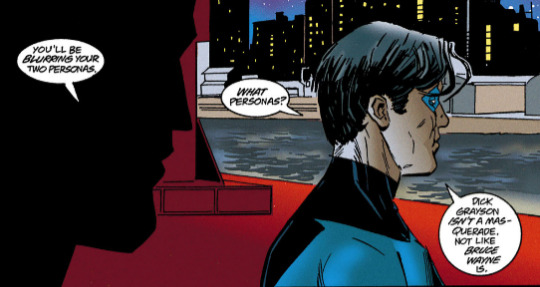
Detective Comics #725
Bruce has many personas he maintains, and he uses all of them according to what suits his need--Batman for places the law can’t go, Bruce Wayne the CEO pushing for systemic changes, Matches Malone for street information, and Brucie the society high roller for society information and social influencing. He is rarely ever not in a persona and simply ‘Bruce’.
His top-down perspective of enacting change are what dictated the usage and necessity of these personas. He has the means and capacity to basically disappear from society if he so chose--he in fact does so to train during his younger years so successfully they don’t even know how long he was actually gone.
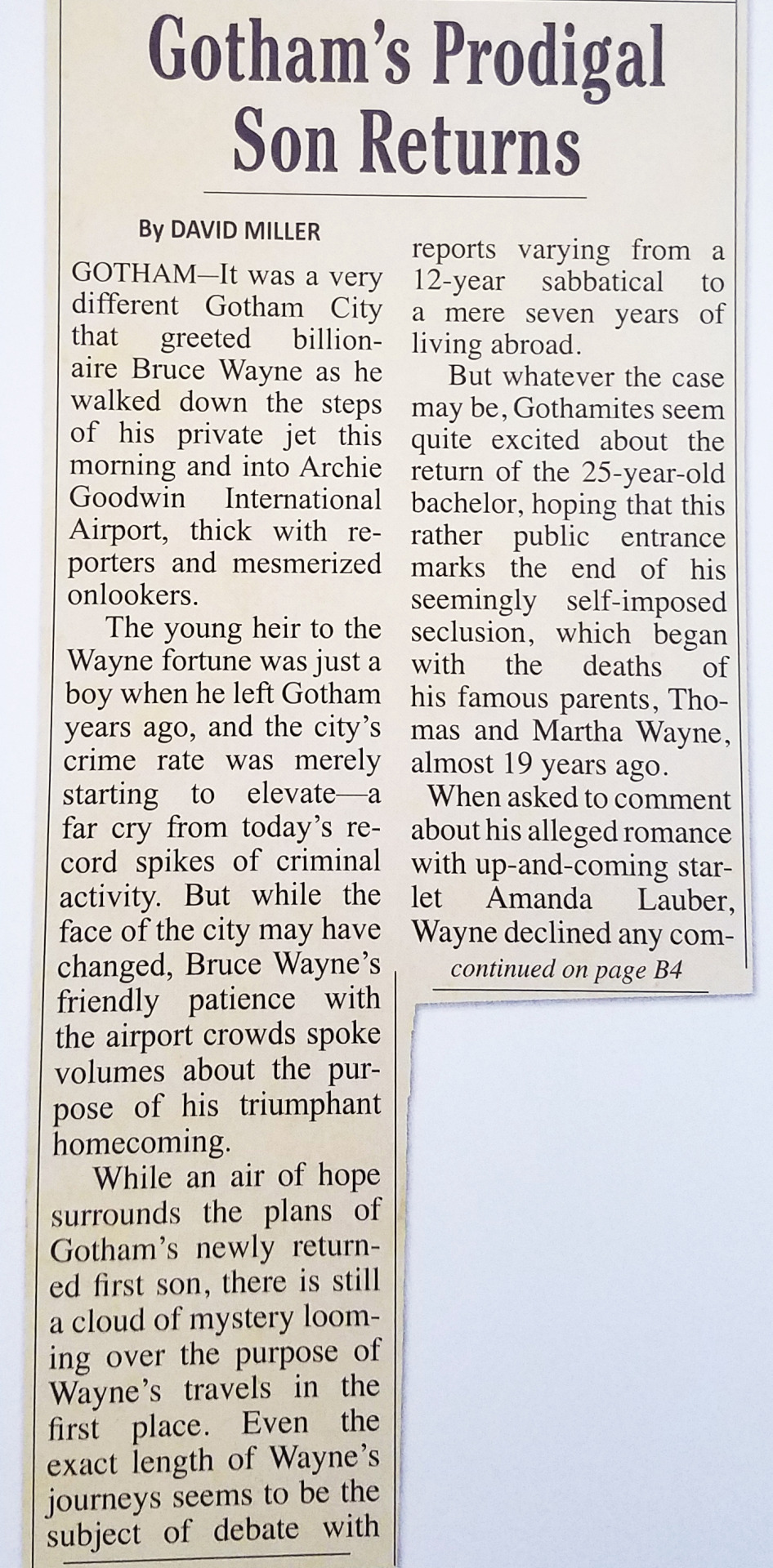
The Batman Files
So he doesn’t need the personas. Not Bruce Wayne, CEO, or Brucie, or any of them really, to protect his identity. That tells us that Brucie is a deliberate choice he made at some point. He could have been a recluse billionaire Batman indefinitely. Even though he fully has the status and means to not maintain a job or a persona or, let’s be frank, a life outside the mask at all, it’s his own work-a-holicness that led to the creation of his public personas. He’s an obsessive strategist, so if Brucie is a choice, that leads us to why?
Bruce does many philanthropic things with his money, but he isn’t the only rich person around, especially not in a city as old and corrupt as Gotham. But he’s one of the very few ones doing good with it.
The comic you mentioned has a very beautiful moment where Bruce touches on that, and in full context you can feel how consumed he is by this goal of creating the Gotham his parents would have wanted. Batman mentions he never sees himself in that place, and the morbid interpretation is that the city kills him before he reaches it, but the hopeful interpretation is that in that shining city, Bruce Wayne and Batman and Brucie and all his masks will no longer be needed.
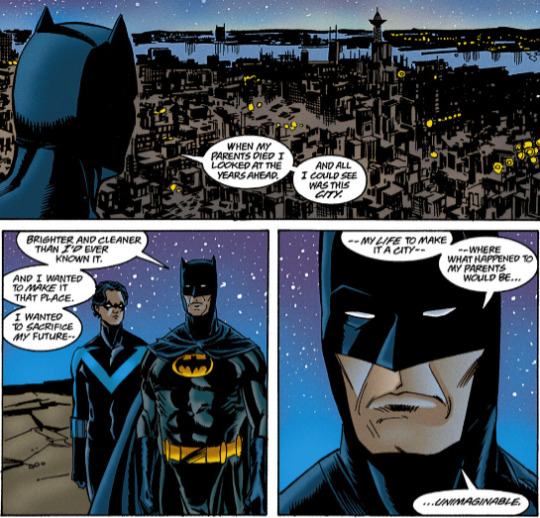
Detective Comics #725
Back in the old days they’d call it noblesse oblige: the inferred responsibility of privileged people to act with generosity and nobility toward those less privileged. Thomas and Martha Wayne ingrained this feeling of responsibility into Bruce by example, and as all things related to them, he obsesses over it. It urges him to fulfill expectations within segments of society he finds onorous for the betterment of society as a whole in order to carry out their unfinished works.
Enter Brucie.
Brucie serves a two-fold purpose. Since Bruce has chosen to maintain personas among society, it becomes a false face to justify any oddities Batman might bring into the life of Bruce Wayne by setting himself up as a eccentric, popular social scion. But that persona itself also allows him to manipulate the upper crust of society.
I have some insider perspective on the kind of society events Brucie attends. They’re all about the who’s who of making connections, name-dropping and networking, and unspoken class-based elitism. Charity events among the upper class have these things at the forefront and the cause is the background. You don’t get your hands dirty, you don’t go out and make change yourself, you pay money to be socially seen and sometimes it happens to go towards a philanthropic cause. If you want to raise money from the rich and keep people with deep pockets coming in the door, you have to have social currency yourself. This is where, and why, Brucie comes in. I believe Brucie ws crafted to maintain Batman’s cover but still attempt to carry on his parents’ legacy to grease the wheels of the rich in the directions he chooses: one of generosity towards those less privileged.
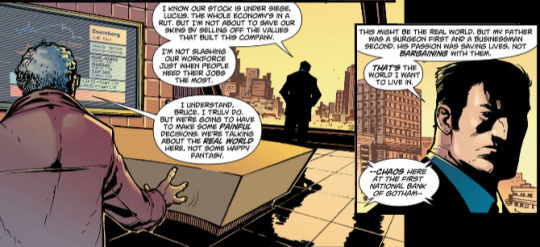
Superman/Batman #51
The inevitable flaw of Bruce’s approach to his personas and their philanthropy is that in a city rife with corruption, money distributed from the top has many opportunities to disappear well before it reaches the bottom. As in many of ways they are complements to each other, Dick’s approach balances that out, because his approach to helping his fellow man starts out at the street level...literally.
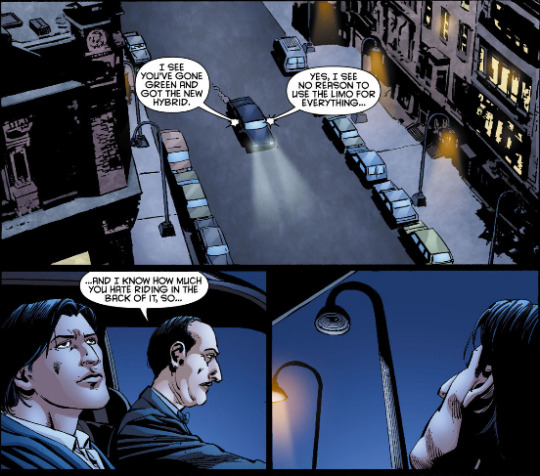
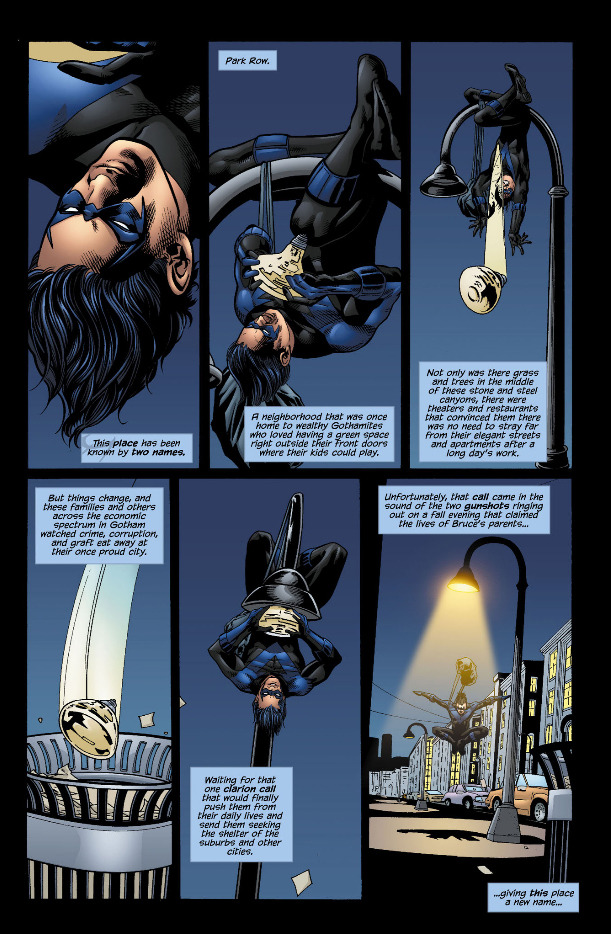
Nightwing #153 (Nightwing: The Great Leap)
Dick, we know, does not come from privilege. His mother was from a middle class family before she joined the circus, and despite being world famous athletes, most circus workers are lower to middle class. The people he grew up with, was comfortable with, were all working folk who expected everyone to pull their weight right alongside each other. He enacts this everyone-together approach in almost all aspects and phases of his life.
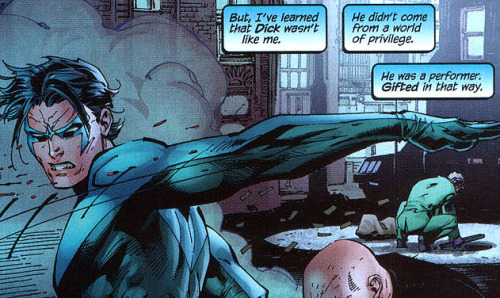
Batman #615
Even once he had settled into being Robin and adapted to living at the manor, he didn’t feel belonging to a culture of privilege, materialism, or high society. He preferred shotgun in the limo to chat with the driver to riding fancy in the back. Once he was able to start making his own decisions about where and how he lived, despite having both Bruce’s money and then later inheriting a substantial amount of his own, he chose mostly lower-class communal places.
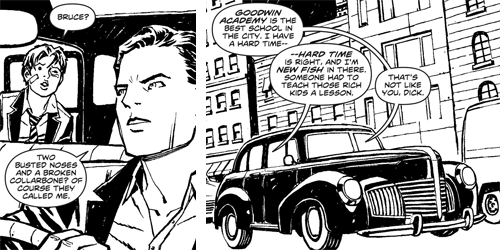
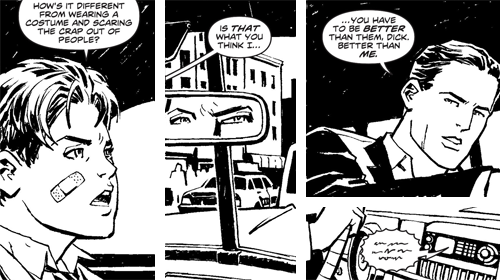
Batman Black and White #6
Dick also doesn’t see the value of throwing money at a problem when there is an option to fix it with his own hands. We see this frequently, from building his own car instead of buying a finished one or outsourcing the work, to deciding the best way to clean out the BPD was to start at the bottom and work his way up (literally), to quitting college because his classes never got prioritized over crimesolving. Most of his day jobs ended for similar reasons.
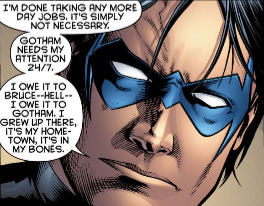
Nightwing #153 (Nightwing: The Great Leap)
Despite the showmanship training, he gravitates away from spotlight on the rich and wealthy, who are notoriously the kind of people who do not get their hands dirty or go out and take care of things themselves, and prefers to find or build communities around the kind of people who do.
Finally, Dick is an extrovert. He doesn’t need to act extroverted as Brucie does because he is extroverted. He likes people and likes being around people. Whether by conscious choice or not, he tends to put himself in situations where he is surrounded by people in nearly all aspects of his life. He chooses apartment buildings whose occupants frequently pass each other on the stairs; jobs that involve interacting with many co-workers, patrons, or students; and collects superhero teammates like Boy Scout badges. And all of these behaviors come very naturally to him.
He doesn’t need a mask or a role or a persona for those kind of interactions; his mask is pre-supplied as “neighbor” or “co-worker” or “teacher” by the situations he puts himself in. It helps make him an exemplary leader, because just by acting authentically to himself, he automatically builds up little communities around him any time he arrives somewhere.
Bruce, on the other hand, is an introvert. For him, interacting with people isn’t easy, automatic, or comfortable unless it has a purpose, but as a strategist, he knows the necessity of human interaction as a catalyst to achieving dynamic change. So he adapts personas to suit people’s expectations. Extroverts have more social currency; the life of the party can generate more resources than a brooding wallflower.
So, it boils down to just a few elements: Dick believes in living and interacting at the street level to accomplish the things that he wants to, and he is extroverted enough that the level of social interaction that entails is not a burden to him. He surrounds himself with the types of people he is more familiar or perhaps more comfortable with, which happens to keep him further out from the media’s eye than associating with the upper crust does. The lower profile is more incidental than intentional, but it lessens his need to have a cover story for every single bruise and lets him get away with even less of a ‘persona’.
Bruce, on the other hand, is introverted and follows a more classist view that systemic change needs to be effected from the top down. His personas are more of a self-assumed duty than a necessity, as a way of trying to carry out his parents’ legacy. Any of his children could have chosen to follow his path in business or the high society limelight, but the sense of obligation toward it is something personal to him that most of them don’t share.
#bruce wayne#batman#dick grayson#nightwing#character analysis#dc#comics#meta#o.c.#bruce wayne analysis#bruce + dick#asks#anonymous#cover stories
214 notes
·
View notes
Photo
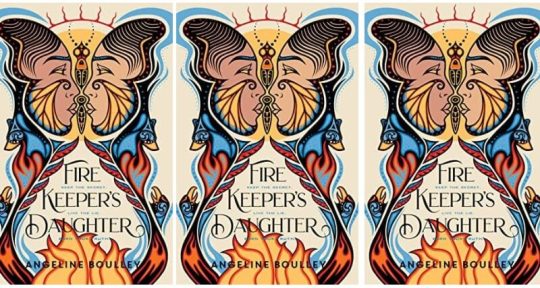
*As is usual with our discussions, there may be a few spoilers ahead, so beware.*
We all were incredibly excited to read Angeline Boulley's FIREKEEPER'S DAUGHTER when we first heard about it, so we decided to make it our second group discussion book for the year. Come join us!
As a biracial, unenrolled tribal member and the product of a scandal, eighteen-year-old Daunis Fontaine has never quite fit in, both in her hometown and on the nearby Ojibwe reservation. Daunis dreams of studying medicine, but when her family is struck by tragedy, she puts her future on hold to care for her fragile mother.
The only bright spot is meeting Jamie, the charming new recruit on her brother Levi’s hockey team. Yet even as Daunis falls for Jamie, certain details don’t add up and she senses the dashing hockey star is hiding something. Everything comes to light when Daunis witnesses a shocking murder, thrusting her into the heart of a criminal investigation.
Reluctantly, Daunis agrees to go undercover, but secretly pursues her own investigation, tracking down the criminals with her knowledge of chemistry and traditional medicine. But the deceptions—and deaths—keep piling up and soon the threat strikes too close to home.
Now, Daunis must learn what it means to be a strong Anishinaabe kwe (Ojibwe woman) and how far she'll go to protect her community, even if it tears apart the only world she’s ever known.
[Note: While we will not go into any great detail in this discussion, Firekeeper’s Daughter contains murder, suicide, kidnapping, sexual assault, addiction and drug use, racism, colorism, and death of parents/family members.
You can read an excerpt of the book here!]
Audrey: To get us started--let’s talk about this gorgeous cover! The cover art was created by Moses Lunham and designed by Rich Deas. The first thing I noticed when I got my copy of the book was that the two faces at the top had different skin tones. According to this interview, author Angeline Boulley says that “the different shades of the faces symbolizes Daunis claiming her biracial identity,” which is a major part of the book.
Jessica: The cover is so beautiful. It’s next to me on my desk right now and I can’t stop looking at it. Love how the cover ties into the themes of the book.
K. Imani: This cover is absolutely beautiful! I love the design of the faces looking like a butterfly as well as the bird and bear (I think) and the fire. There are so many subtle images in this cover that you can almost find something new each time. And the colors are so stunning. Like you Audrey, I noticed the faces had different skin tones which I found interesting and made me wonder what was going to happen in the book. Knowing the faces symbolize Daunis’s biracial identity now is powerful and really brings home the meaning of the book.
Crystal: I agree that the cover is gorgeous. In addition to the aspects of her physical appearance and physical identity, Daunis’ cultural identity is also displayed within the illustrations with bears representing her clan. In addition there are the birds like the one that guides her and the sun is in the background too which is from the story of the original Fire Keeper’s Daughter. The faces forming a butterfly is also just brilliant for a coming-of-age story. There’s so much to see. Each time I notice more.
Audrey: Daunis, our heroine, is on the older end of the YA protagonist spectrum at 18. She’s dealing with a lot of upheaval in her life, and things only get more complicated in short order. Something I really liked about Daunis was how often she thought about and evaluated what her responsibilities were--to her family, to her friends, to her community, and to herself. These sometimes complementary, sometimes competing, responsibilities strongly influenced her decisions.
Jessica: You mention the complementary and sometimes competing responsibilities -- that’s exactly it. I loved how her thought process was explored throughout the book in such a thorough and complex way. The way Daunis balances and reconciles the interests of her community with what the FBI wants from her and her quest for justice is laid out really clearly. Sometimes, narratives can tend toward simplistic, binary summations of the issues people, especially from marginalized communities, face -- but that’s just not the case, and Daunis really highlights that. To be honest, I was a little nervous at the introduction of law enforcement and the FBI, given the racism and oppression baked into these institutions, but the way Daunis navigates her interactions with them, plus the way other members of the community tell the truth about these institutions, really played out in such a nuanced way. (I really, really hope that the Netflix adaptation keeps these nuances and hard truths in the show, but I suspect that won’t be the case, unfortunately.)
K. Imani: I enjoyed that Daunis was 18 and on the cusp of adulthood. So many YA novels focus on the character’s high school life but a lot does happen and teens do grow and change a lot in that year after high school. Many have left home for college (that was me) or working full time and they are learning how to navigate a life that was not completely so structured. In addition to having to deal with changing friendships as people move away or just become busy. It’s a unique time and I loved that we got to spend time with Daunis as she was going through this change. She was learning how to become an adult in one of the most stressful ways possible, and sometimes I felt she was a little too idealistic, but I’m glad that she kept her truth throughout and was focused on helping her community in addition to helping the FBI. Her perspective helped keep the investigation grounded in what mattered which wouldn’t have happened if she wasn’t involved.
Crystal: Daunis balances a lot of responsibilities and really tries to follow what she’s learned from elders. She considers how her actions may affect all of her relatives within her family, clan, community, and beyond. Boulley embedded a lot of elder wisdom within Daunis’ inner dialogue such as thinking about the seventh generation when making decisions.
Audrey: One of the things that I really appreciated about Firekeeper’s Daughter was the depth of the setting and the characters in it. While Boulley says that Daunis’s tribe is fictionalized in the author note, it’s clear how much care and thought Boulley put into creating Daunis’s community. It’s filled with people who have complex histories (both within and between Native and non-Native groups), with differing opinions and prejudices and goals.
Jessica: This really highlights how important it is to have stories where cultures and communities aren’t portrayed as a monolith. It’s not just the right thing to do, it makes for a better and more accurate story. I read Firekeeper’s Daughter and watched the TV show Rutherford Falls back to back, which really drove home the power of depicting a community with nuance. (Also, sidebar: Highly recommend checking out Rutherford Falls, which does this really well.)
K. Imani: One of my favorite aspects of Firekeeper’s Daughter were the elders in Daunis’s tribe and how we got to hear many of their individual stories which showed the complexity of real life. I loved that Daunis listened to her elders, really took in their stories and learned from them. Her interactions with the elders greatly contributed to her growing sense of self and her desire to help her community. And this is where this novel being truly #ownvoices shines because of Boulley’s connection to her community that she took great care in making sure Daunis’s tribe felt real and authentic as well as culturally accurate. It was not full of stereotypes but filled with real people who had real lives and real stories. I was drawn into Daunis’s community and really cared about the people that made Daunis who she is and becomes.
Crystal: Like Jessica says, there is a lot of nuance here. When you have a wide variety of characters who are not simply good or bad, the story has more power and is definitely more believable. The people in our everyday lives are also complex and have a story if only we take the time to listen. This is what Daunis excels at with elders and others around her. She is paying attention and trying to connect with people. There is a lot of love throughout the book of many different types. The love is beautiful and yet also has some ugliness too in the betrayals. It’s not picture perfect and that makes it so much more real.
Audrey: Boulley tackles a lot of difficult topics in Firekeeper’s Daughter, especially ones that can hit hard on a community level. Much of the plot focuses on drug use and addiction, of course, but violence against Native women also has a significant impact on what happens in the book and affects multiple characters, including Daunis.
Crystal: Daunis and the other women are examples of the many, many, women who have been harmed in the past and the present. That’s not the whole story though. As Daunis is learning, there are many ways of being brave. Throughout the story, we see many women being strong and brave though at initial glance their actions may not seem to be either of those things. There is bravery in speaking out, but sometimes bravery requires something else. These women have done what they needed to do to survive or help their loved ones survive.
Audrey: Firekeeper’s Daughter has a complicated ending, and it left me thinking about two things. The first was how proud I was of Daunis and her character growth. There were a couple of times where she came across as very Not Like Other Girls (particularly with the hockey players’ girlfriends), but that changed over the course of the book. The second was grief at how many people and institutions failed Daunis and her community, both within and without. Just as one example, even though Daunis is a confidential informant for the FBI, the FBI doesn’t come out of this story as a Good Guy.
K. Imani: I was torn by the ending too. I so wanted justice for Daunis and Lily and for others who were murdered, but on the other hand life doesn’t always have a happy ending and I recognize that Boulley gave us that horribly realistic ending because the fight for missing and murdered Indigenous women continues and the fight for justice for Indigenous peoples. It was a heartbreaking reminder of a very real issue. On the other hand, I was so proud of Daunis as well. She was able to achieve her goals of helping out the FBI while staying true to herself and her community. She grew so much as a character and really found her place in her world.
Crystal: The ending gave me much to think about too. Daunis grew a lot as she worked through this complicated puzzle in her community. She learned much about herself and some of the assumptions folks have about others. I also really, really wanted justice, but unfortunately, would be unlikely in real life with our current justice system. I also found Jamie’s growth to be interesting. He is truly struggling with his own identity as an adopted child with Cherokee roots, but no Cherokee teachings or culture to turn to. I don’t know if a sequel or companion book is planned, but I would be interested in seeing more of their journeys whether their paths cross again or not.
Jessica: Audrey, thanks so much for leading this discussion! Now I have a question for you all -- what YA books by/about BIPOC are you reading right now?
For AAPI month, I’m rereading Turtle Under Ice by Juleah del Rosario. After that, I’m planning on reading The Ones We're Meant to Find by Joan He, Apple: Skin to the Core by Eric Gansworth, and Witches Steeped in Gold by Ciannon Smart! Yes, my TBR pile is excellent. :P
Audrey: Next up on my list are The Theft of Sunlight by Intisar Khanani, Forest of Stolen Girls by June Hur, and Simone Breaks All the Rules by Debbie Rigaud. I feel like that’s a pretty good mix of genres and authors right there!
K. Imani: Since I’m needing some inspiration for my vampire manuscript, I’m re-reading and new reading some vampire novels. Currently I am reading Fledgling by Octavia Butler then up next is Renee Ahdieh’s series The Beautiful and the sequel The Damned.
Crystal: I just re-read Saints & Misfits and then dove into the sequel Misfit in Love. S.K. Ali is an author that I really enjoy and I am loving it so far. Next up is American Betiya by Anuradha D. Rajurkar along with Love & Other Natural Disasters by Misa Sugiura. I also think my TBR is pretty stellar.
If you've had the chance to read FIREKEEPER'S DAUGHTER, please join in the discussion below! We'd love to hear what you think.
20 notes
·
View notes
Text
Decebal Avram Chirilă SFW Alphabet Slasher OC

Authors Note: Just trying to work more on his character so I decided to try this SFW Alphabet. ENJOY!
A = Affection (How affectionate are they? How do they show affection?)
Decebal is a person that isn't afraid of public display of affection, if he likes someone he will let them known, through compliments, flirting, hugs, and so on. He may come off as a womanizer (which he kind of is), but that's really just how he is. All his life during Romanian Communism he's been neglected completely from affection; the most he got were more mature women complimenting on how cute he was.
Even if you're just his friend, he will hug you, wrap his arm around your shoulder. Don't strictly take that as a romantic gesture. He is just friendly.
B = Best friend (What would they be like as a best friend? How would the friendship start?)
This Romanian as a best friend? You're basically having yourself a loyal dog that will take a bullet, grasp a knife and give his life for his best friend. He hated himself for not being strong to save his parents so now as an adult, he protects the people that have a big value in his life.
He may seem very friendly, but he has a hard time trusting someone, and that someone has to prove themselves trustworthy, mostly because Decebal is a wanted man and he meet people that played the 'friend' role only to stab him in the back. If he calls you brother or sister, then you can count on him anytime. His word is gold.
C = Cuddles (Do they like to cuddle? How would they cuddle?)
Decebal loves hugs and cuddles, and he has no problem in sharing. This man is touch-starved for affection, although he will never admit it.
He usually loves to hug and cuddle from behind, his big arms wrapped around you, his chin rested on top of your head or if he's in a really good mood, he will spin you around. Romanian Rollercoaster!
D = Domestic (Do they want to settle down? How are they at cooking and cleaning?)
Alright, this man has very big issues with settling down and the whole marriage deal; although not impossible! As I said, he has a hard time letting anyone get close to his heart. It's kind of a paradox because he is starved for affection, but he runs like hell from marriage. You need to have nerves of steel if you want to get him into a little more 'serious' relationship. That strictly depends on you if he views you as a one-time thing or something more. All the women that were around him as a child after his parents were killed, were company ladies or prostitutes, toxic women so for him to meet someone who is genuinely nice to him out of no reason is a little more like a fairytale for him.
E = Ending (If they had to break up with their partner, how would they do it?)
As friendly as this man is, he is also very blunt. Decebal isn't the type to beat around the bush; if he has something to say he will. He is most of the time very honest and probably his words might hurt you, but he doesn't like to get drunk with water, which pretty much means he isn't the type to even lie to himself.
F = Fiance(e) (How do they feel about commitment? How quick would they want to get married?)
As I said above, marriage is pretty much a subject and a level he wants to step aside and avoid. He is a rogue one who loves to taste freedom in all ways. He had enough of the restrictions during the Romanian communism, so his outlaw life is something he cherishes. You will have to be someone who isn't into poly relationships. You may be his significant other (Again.... How did you do that?), but that doesn't mean you can tell him what to do. Stubborn Romanian Ass.
G = Gentle (How gentle are they, both physically and emotionally?)
Decebal is a pretty gentle guy in his day to day life; he prefers to love than to fight, but again.... If the last resort is fighting, oh boy. He is the type to open the doors to the ladies, smile their ways, or compliment them. That's I suppose his gentle nature. He basically has three moods; the gentle romantic lover, the sassy and vulgar punk, and finally the fast, sadistic swordsman assassin.
On 80% of the time, he is a combo of the first two. The last one is a rarity because he prefers to smile than scowl, but he is called The Impaler for a reason.
H = Hugs (Do they like hugs? How often do they do it? What are their hugs like?)
I did mention it in the cuddle part. He is a hugger and will do so with almost anyone who is nice to him or doesn't show to be his enemy. His hugs are very nice, especially when he does them from behind, twirling you around if he is in a very good mood.
I = I love you (How fast do they say the L-word?)
There are two ways that he says these words. One is when he is in a jokester mood saying something like 'Awww... I know you love me.' Then the more serious way that takes a lot to pull from the Romanian's lips. He may say the L-word but it depends on how he says it. That makes the difference.
J = Jealousy (How jealous do they get? What do they do when they’re jealous?)
He really isn't a jealous guy. Decebal values freedom most of all things and he doesn't want to be a possessive asshole to his s/o if that's the case. He gives you freedom, so he expects you to do the same.
If it's for example about someone he likes and someone hits on them, he will probably increase his game, topping his competitor, because Decebal has Latin blood running through his veins and he knows how to take someone's mind with his charms.
K = Kisses (What are their kisses like? Where do they like to kiss you? Where do they like to be kissed?)
Romanian lover, French kisser. He loves to leave his partners with a dazed look after a kiss, so his kisses are full of passion and sensuality, his hand running through your hair, while his other hand strokes your hip. All the time his eyes are half-lidded looking into yours.
As for where he loves to be kissed? Try kissing the nape of his neck, you will feel him shiver and look over his shoulder at you with a cheeky smile.
L = Little ones (How are they around children?)
He has a weak spot for children mostly because he knows how sensitive these little ones are. He was a little guy himself when his parents were killed, so he knows what such a tragedy can do to one. As for if he wants children? He isn't a father figure. Sometimes he acts like a teenager and he doesn't see himself be able to raise children with his style of life.
M = Morning (How are mornings spent with them?)
Mornings are probably either very funny or lazy, depending on how he spent the night. He can wake up full of energy, blasting Romanian music in his headphones, singing, and preparing for the day. Lazy mornings are usually in bed, crawling downstairs and trying to prepare his coffee, drool running down the corners of his mouth.
N = Night (How are nights spent with them?)
If you're a night person you got yourself a night owl. He loves to stroll through the city, going to a bar, having a few drinks, going to a club. Or if you prefer a much quieter environment, you two can sit down on the front porch, talking about whatever topics you want. He is a pretty cultured person so he can keep up a conversation all night long. Ooooor.... if you want a much more sensual night.
O = Open (When would they start revealing things about themselves? Do they say everything all at once or wait a while to reveal things slowly?)
Alright; Decebal has the whole super confident guy attitude with a cheeky grin, all tall and handsome, but he has also a very sensitive side. He will reveal little by little about his past, torture, nightmares when he feels he can 100% trust you. Despite his loud nature, he also has a mysterious vibe that attracts people, especially ladies aaaand also danger to him.
P = Patience (How easily angered are they?)
You really need the talent to anger Decebal. In his opinion, life is too short to have a scowl on your face. Like the Romanian saying 'Faci haz de necaz' which basically means 'I'm laughing at trouble'. All his childhood was depressing and gloomy and he is simply tired to victimize himself.
He really doesn't get mad so easily, but God help you if he gets angry, because it's like seeing Romania's bloody history depicted into a person.
Q = Quizzes (How much would they remember about you? Do they remember every little detail you mention in passing, or do they kind of forget everything?)
He has a pretty good memory and will remember everything you told him. Your favorite flowers, your favorite dish. He will remember. He doesn't forget if someone helped him and he doesn't forget when someone did it wrong.
R = Remember (What is their favorite moment in your relationship?)
He never had a long term relationship. All his relationships, if you can call them that were just for one night or even for a few hours. His life in his home country was harsh and he didn't have the privilege to meet someone he could call HIS. Then after leaving his country, he never stayed in one place which made relationships non-existent.
S = Security (How protective are they? How would they protect you? How would they like to be protected?)
Decebal is very protective if you are someone he cares for, protecting you even if it means giving his own life. He is a 'Go hard or Go home' guy. He lost too much when he was young because of his cowardice, so when he unleashes his swords is dance time.
T = Try (How much effort would they put into dates, anniversaries, gifts, everyday tasks?)
He is a romantic guy by heart and he loves to make his special one feel that way; a bouquet of flowers, something that he remembers you saying you want.
As for effort in general, he puts 100% of his blood. All his life he had to work hard until collapsing and none cared. He digs his teeth into the task at hand and won't give up just because it hurts. He faced enough abuse as a child to know that there are worse things than a back full of whip marks or broken fingers.
When he was young he used to be tortured if the task given to him wasn't done properly and it's in his system to do it right.
U = Ugly (What would be some bad habits of theirs?)
Probably his flirty attitude towards most people, which in his opinion is just friendly. Even if you magically are his s/o old habits die hard and he can be a real womanizer, so let's hope you're someone who can put up with a lot.
Another bad habit, or rather a good one? Depends on how you view it, is his daredevil side that makes jokes even in the face of death. Dying with a smile on your face and a good laugh? Sounds familiar.
Emotional Intimacy? He doesn't like this territory mostly because he feels like the coward he was as a child. Putting his feelings on a silver platter is a challenge for him and he usually screws up by taking everything as a joke.
V = Vanity (How concerned are they with their looks?)
He knows he looks good. He knows he is handsome. He knows the ladies dig it. He is mostly 50% concerned with how he looks. He makes sure he is clean, smells good and his hair is in that messy bedhead the women swoon over.
W = Whole (Would they feel incomplete without you?)
Probably if you and he have been together for a very long time. He just got used to you being around that when you leave is kind of depressing sight, but freedom is the most important thing for him, so he will swallow everything down and wave you goodbye, going on his lonely path yet again.
X = Xtra (A random headcanon for them.)
One of the things that really may trigger his vulnerable side would be someone choking him because that reminds him too much of the days in jail as a child and teenager, the warden there being the father figure that used to choke him under the dirty cold water that reeked of rats on an almost daily basis.
Y = Yuck (What are some things they wouldn’t like, either in general or in a partner?)
He doesn't like controlling people, people that think they can make anyone do what they want just using the fear as a weapon. It reminds Decebal too much of the dictator of his country during the communist system. He went through much in his life to have his freedom be taken away... again. That is something that haunts his sleep at night, one of the reasons he mostly spends his nights out and his days sleeping.
Z = Zzz (What is a sleep habits of theirs?)
He is usually sleeping during the day, mostly because he prefers to spend his nights strolling through the city, anywhere where he can be free, none to tell him what to do. He is usually sleeping on his front with his face buried into the pillow. Usually, if he wakes up in the middle of a nightmare, he stays awake and looks out the window or on the roof of the house or building, letting his mind known that he is free. He isn't chained.
22 notes
·
View notes
Text
One Piece 1000 - 10 Confessions as a One Piece Fan
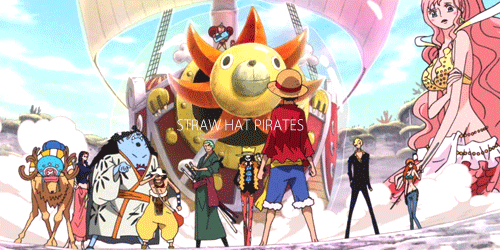
Although we did the Initial Thoughts a week ago (a long week ago, damn) which you can read here I wanted to do something for the official release of One Piece’s 1000th Chapter
At first it started out to be ‘10 things I wanna ask Oda that I don’t think we’ll ever know’ but I couldn’t think of 10, then I was gonna do a General opinion post about it, but didn’t want it to come off too negative. So I am settling on a confessions post, which will have elements of these anyway.
So as we have a happy 1000, let’s talk about some stuff I usually don’t get to talk about in One Piece
Note: There will probably be spoilers so make sure you’re up to date
10. Late Beginnings
I think the first confession I have to have is that despite being older than One Piece I am unfortunately not a ‘Day One’ fan. In fact I think I mainly got into One Piece around mid-Whole Cake Island arc, before I had of course known about One Piece, it was a ‘Big Three’ anime after all but the most I knew about it was that they had a guy named Luff-y and another called Zorro, and it was about ‘Pirates who can’t swim’. My curiosity only developed when in a youtube deep-dive of anime clips I kept being recommended One Piece clips, and decided to give a couple a go. Most of them were Paradise arc stuff from the anime, the dub voices were mostly atrocious so I stuck to sub. I was happily surprised about the amount of fun and emotional weight these clips gave me, which led me to check where One Piece was as of current and backtrack from there (Ironically I did the same with Beastars). I did eventually get caught up around the time of the Mafia Meeting and I’ve kept up with each chapter since.
9. I mostly still prefer the Pre-Timeskip looks
When I first felt this I thought it to be pretty controversial, nowadays not so much. I understand that Oda wanted to change the look for many characters but some of them did feel like a downgrade. I think the ones who got it worst was Franky, I think it’s the bulbous shoulders, Franky was no stranger to body horror from Enies Lobby to Sabaody but I kinda preferred that he still had a lot of his humanity rather than looking like an action figure. Otherwise I think Robin, Nami and Chopper had it bad, maybe Brook too but his was more fashion than design; the women in general took heavy hits by Oda’s proportion design - I mean I get it boobs are nice but proportions are what make them better - but Robin also underwent a skin color change in the anime, who pre-timeskip shaded her skin darker than in the manga and corrected it to match the manga, I think most of us would’ve preferred Robin to have kept the darker skin tone and possibly even the fringe, Robin’s hairstyle (and her fashion in general) can be hit and miss. I go to and fro about Nami, other than the general waist and bust adjustments I think it fits her character to use her sexuality a bit, she was no stranger to that pre-Timeskip, sometimes though I can’t tell whether I preferred her with short or long hair (Short was definitely better on Nojiko), I do think though that Oda could have her show less skin, she is still very pretty in outfits such as Water 7, Thriller Bark and even her fake pirate disguise in the early chapters/episodes. Finally with Chopper I think it was a bad move to alter the hat, that was a memento from his father figure Hiriluk, it’d be like if Luffy altered his straw hat or Zoro replacing Wado Ichimonji, I do also feel that the design for Chopper’s points while easier to draw don’t look as good, I think a lot of it is the scruff, or lack thereof in favour of smoothness, Walk Point is fine but Heavy Point, Guard Point and Horn Point seem less threatening, Monster Point especially too, in Enies Lobby he looked like a cave painting of menace and destruction, now he’s smoother and his scruff lighter so it’s not as good. The rest of the designs I’m quite fine with though.
8. I wish some markings stuck as well
Tattoos and Scars seem to be optional in the One Piece world sometimes, unless it’s branded in molten heat like the Dragon’s hoof, Sun Pirates logo or an attack from Sakazuki. While Nami’s redesigned tattoo has stuck around and Luffy and Zoro’s scars persist, they are mainly character reminders/mysteries for huge moments in the story, and I kinda wish that some of the Straw Hats had littler markings, not just scars either. For instance, the Alabasta X on the arm, I really wish that stayed on each of the Alabasta characters’ arms since it was a symbol of friendship with Vivi, I also wish that Luffy kept the 3D2Y mark on his arm. In terms of scars though it would’ve been nice to see the characters a bit more battle-worn; Zoro’s ankle scars from Mr. 3 have faded and frankly he should be covered in little and long scratches given his fights with Mr. 1 and 2 years of Mihawk Training, Nami’s shoulder scar is hidden completely by her tattoo and she has no scars on her hand (from fake stabbing Usopp) or foot (from blocking Miss Doublefinger), Usopp himself could’ve used some small scratches because lord knows how there’s even still bones in his nose plus he was in murder island for 2 years, Chopper could at least have a small bald patch from when his shoulder was impaled and burned by Shura’s fire lance too, other than that there’s just Jimbei’s potentially missing shoulder scar from Marineford, though Oda has kept it obscured a lot so maybe that is still there. I understand why Oda doesn’t or forgets to, but it would’ve been nice if we lived in a vacuum of no time limits and whatnot.
7. Dead End Adventure is my favourite One Piece film
I don’t know what it is, but Dead End Adventure just gives me the most fun out of the One Piece films. It has a good side plot and the side character Shuraiya was a blast of a character. Granted, Gaspard wasn’t too good of a villain side for actually harming the straw hat and his defeat was a bit underwhelming but the race, the settings it was all fun. It is not to say I don’t enjoy any other One Piece movies, I delight in the horror fuel of Baron Omatsuri - and that killer final punch - and Z’s tragic tale of a fallen marine, Strong World has that epic entrance to the party and Stampede also had some great team up moments and fantastic writing for Usopp and Smoker but Dead End Adventure always feels like the movie I could watch in any mood.
6. Skypeia and Fishman Island are some of my favourite arcs
While I can understand the criticism of the Long Ring Long Land arc (especially since the anime dragged out the Davy Back Fight) it surprised me that people found Skypeia and Fishman Island arcs to be boring or less entertaining than previous arcs. Everyone has their preferences of course but I felt that Skypeia and Fishman Island were very powerful arcs especially with the theme of racism. Both had glorious setting design different to the common customs of the world we had seen, Oda made both Skypeia and Fishman Island feel very much lived in with its own budding culture and prejudices, with a villain who was dead set on destroying everything just to have their way. With Enel and his priests we were able to push several characters to newer limits, with Robin showing her fighting capabilities, Zoro learning his projectile slashes, Chopper having to endure fighting 3 priests and even Usopp growing all the more braver in the face of seemingly indestructible opponents and later gaining access to the dials. With Fishman Island it was different because it was basically a ‘flex arc’: where the main villain is meant to be a stepping stone rather than a threat but even then the symbolism of the enemy is what’s significant with them, the inherited hatred of humans. But at the same time we do learn new strengths from the crew; Red Hawk, the use of armament Haki, Skywalk, Hell Memories, Franky Shogun, Usopp’s pop greens, Nami’s weather eggs, Brook’s Soul Solid and his new DF power (which is possibly an awakening), as well as the first true steps of Jimbei joining the crew.
The biggest strength of both arcs is the flashback as well, like Wano would in present time both arcs demonstrated that Oda can carry a story without his main characters and still keep it as captivating as ever, be it the friendship of Noland and Calgara, the tragedies of Otohime and Fisher Tiger or the life of Kozuki Oden and the man who would be Pirate King. And the impact of Fishman Island and Skypeia’s flashbacks both come back around in Dressrosa with the dwarves and Koala, and Fishman Island really does kick off the whole Yonko saga with Luffy challenging Big Mom, these arcs were definitely significant as they were entertaining with silly faces, strong fights, challenging themes, lorebuilding, good side characters and unique twists.
And the overall message of healing from the past is still significant to this day. Through Wyper’s sacrifice and the Bell ringing to Jimbei giving blood and the Ryugu royals wanting to attend the Reverie, it is all very powerful stuff and while the arcs are similar in nature its their similarities that make me love them. Also the cover stories with Enel and Gedatsu on their own mini adventures are fun
5. I really want to know where Ghin is
Ghin/Gin was such an interesting character in Baratie. Given that this was right before Arlong Park too so we had not seen a character conflict with different loyalties in One Piece until then, his gratitude to Sanji against his loyalty to Krieg created a fantastically complex character, but then he left and we didn’t hear about him ever since. Did he survive Krieg’s poison gas? Is he still with Krieg? One reactor of the episode said “maybe he’ll become the next Don” which was a concept I kinda really liked. The guy was pretty strong given that he had bested Sanji at that time, and since he didn’t appear in a cover story my mind does wonder.
It’s not just Ghin either, a lot of the early East Blue characters kinda fell off the map; where is Morgan? Last we saw he was sleeping as he sailed past Jango, where is Kuro? For someone wanting to resume piracy after some years off he has been very quiet, where is Krieg? Only Arlong and Morgan were arrested and the latter escaped so the rest of these characters are a mystery. Recently in Wano I am still wondering where Law’s crew that he brought to Onigashima went, as well as Caribou - where is that slippery bugger?
4. Basil Hawkins is probably one of my Top 5 Supernova
There’s something about that dude I gravitate towards, which makes it quite frustrating when the anime decides to add extra malice and creepy faces to him. Hawkins in Wano is still a victim, if anything he is simply a prisoner with better working conditions, if he thought he could survive escaping Kaido he would but he doesn’t so he won’t, he’s also gonna feel sore about Drake betraying him and letting Law cut him up, so it annoys me that Hawkins is seen like a villain. Not only does he have an extremely interesting Devil Fruit and creativity with it but he’s also audaciously confident in his fortunetelling, even Luffy ran from Kizaru at Sabaody while Hawkins looked at his cards while Kizaru was about to boot him to holy hell and said ‘nah I’m not dying today’, you gotta respect that moxie. At the same time though as a pirate he has that shades of grey element, he’s okay with letting some of his crew be disposable and we don’t even know to what end, he doesn’t look like a guy too concerned about being Pirate King or having riches. I also get a good laugh in that his hobbies are interior design, it makes me really want to see what the inside of his ship looks like.
I think as a top 5, I have Luffy, Zoro, Law, Hawkins and then Kid, Bege, Killer and Bonney are not far behind with Apoo dead last because fuck Apoo. Kid and Killer are cool but I do feel like they need a bit more character, Bege earned some points in being funny and his care for his family in WCI and then there’s Bonney - I really hope we dig into Bonney’s significance, she feels really important and that mystery keeps her fresh whenever we see her. Drake too has only really started to become interesting because of SWORD, we could still see more fleshing but for now he is like bottom 3. It’s a shame Urouge has to be so low, he’s not bad but he’s not spectacular either, gotta admire his hobby of lovemaking though, you do you Urouge.
3. I don’t think that either of the ‘Most Beautiful Women in the World’ are the Most Beautiful Women in One Piece
The in-world consensus seems to be that the Most Beautiful Women in the World are Boa Hancock, Komurasaki and Shirahoshi, and granted they are very pretty, but the most? Not for me. I mean, y’all know that Nico Robin, Nami and Vinsmoke Reiju exist right? Makino as well is stunning, as are Tashigi, Bonney, Margaret, Ishilly, Nojiko, Vivi, Rebecca, Pudding, Perona, Cosette and I’m sure a few others, realistically I think they could all give them a run for their money. I get how for those three their beauty is a plot point (Boa it’s drilling home Luffy’s obliviousness to it, Komurasaki it’s the swerve of her not being awful and for Shirahoshi it’s due to Vander Decken IX pulling the creep factor on her) but it would’ve worked the same way without the ‘world’ hyperbole I think. As much as Oda is iffy with proportions and rarely writes women with as much attention as the boys he sure knows how to make them attractive.
2. Some of my favourite individual Straw Hat scenes aren’t in Canon
If I were to have a top 5 moments of each character, it may surprise you that some of it comes from movies or filler episodes, particularly Sanji’s flexing on Jessica in the G8 Arc (in fact, Jonathon is one of my favourite marines, T-Bone is in there too, but I don’t have room to fit that). Some are of course obvious because of how iconic they are but it does go to show that sometimes filler isn’t all bad. Since you’re probably curious:
As a Group
Goodbye Merry [Enies Lobby]
Entering Shiki’s Palace [Strong World]
Walk to Arlong Park [Arlong Park]
Entering the Grand Line [Reverse Mountain]
vs a Stuck Oars [Thriller Bark]
Jimbei
Giving Luffy Blood [FMI]
Vagabond Drill on Big Mom [WCI]
Leaving the Big Mom Pirates [WCI]
Returning in Wano [Wano]
Trying to argue with Luffy [FMI]
Brook
vs Chess Soldiers & Big Mom [WCI]
Flashback [Thriller Bark]
Breaking Mother Carmel’s Picture [WCI]
Baron Corpse vs Dog Minks [Zou]
Hysterically laughing at seeing Duval [Sabaody]
Franky
vs Senor Pink [Dressrosa]
Playing with the Kids [Punk Hazard]
vs Fukurou [Enies Lobby]
Freedom Roller [Wano]
Trapping Caribou in the Barrel [FMI]
Robin
I Want to Live [Enies Lobby]
Clutching Spandam [Enies Lobby]
Throwing Usopp under the bus [G8]
vs Yama [Skypeia]
Clutching Tequila Wolf guards [Amazon Lily]
Chopper
Monster Point [Enies Lobby]
Flashback [Drum Island]
Chopper Man (& Minoru Kazeno) vs Usobada [Chopper Man Special]
Don’t blow the whistle: Immediately blows whistle [Skypeia]
Dr Chopper the definitely Human Doctor not wearing fake glasses [G8]
Vivi w/ Karoo (she counts okay!)
Goodbye speech [Alabasta]
Escaping Bon Clay [Alabasta]
Karoo Digging Luffy Out [Little Garden]
Luffy Fan Club Meeting [Reverie]
Slapping Usopp awake [Drum Island]
Nami
vs Kalifa [Enies Lobby]
Standing by the kids [Punk Hazard]
Saying goodbye to Bell-mere [Arlong Park]
Helping Luffy vs Cracker via Lola’s Vivre Card [WCI]
Luffy WILL be Pirate King [Wano]
Sanji
‘I needed a light’ [Skypeia]
Flexing on Jessica [G8]
Saving the Vinsmokes [WCI]
O-Soba Mask [Wano]
vs Doflamingo [Dressrosa]
Usopp
Alabasta speech [Alabasta]
Awakening Observation Haki [Dressrosa]
Sogeking Theme Song [Enies Lobby]
vs Perona [Thriller Bark]
Saving Luffy from the fire [Stampede]
Zoro
Nothing Happened [Thriller Bark]
vs Ryuma [Thriller Bark]
vs Mr. 1 [Alabasta]
vs Gyukimaru & Kamazo [Wano]
“He’s sweeping our floors that fiend!” Test of Luck [Loguetown]
Luffy
‘On the Sea, you fight Pirates’ [Wano]
Red Roc [Wano]
vs Katakuri [WCI]
Haki clash with Doflamingo [Dressrosa]
Punching Saint Charloss [Sabaody]
I will have to say that for some characters I could go to 20 so if one’s missing it may’ve just missed the mark, such as Usopp and Nami vs Enel or Luffy putting back a Zombie or Stealth Luffy, I mean it is 1000 chapters as well as movies and filler episodes/specials...
1. I’ve learned quite a lot due to One Piece
Since my fascination started with a deep dive of checks, I did start to learn a hell of a lot more not just about the franchise itself (you know it’s almost catching up BATMAN on total sales, which has been around more than 3 times longer?) but I also learned a lot about stuff Oda has used as a reference key; folklore, actual pirates, actual practices, the amount of detail Oda puts in is astounding. Which does lean into another thing I’ve learned, One Piece has changed the way I approach some of my ideas for writings and whatnot, before I would be afraid of either spoonfeeding or being too vague, Oda’s mastery not only in storytelling but character development, character quality and pacing has both helped and intimidated me a lot of times, I mean consider this: it took hundreds of chapters to get a proper backstory on Luffy, the main character, how unprecedented is that? Often I could fall into the trap of making sure you knew everything about the main character from day one but now I wonder about what’s necessary for the now and what can I work on.
Another thing that both inspires and intimidates me is his drawing, I suck at colours and still do, and a lot of Oda’s attention to detail is incredible considering he’s gotta whip that out on the weekly, but at the same time you see some of his rough sketches and they’re pretty similar to a rough sketch of my own, so in a way it’s a ‘there’s still hope for you’ moment seeing those.
I can’t say I’ve learned Japanese from listening to One Piece, but I have picked up on some stuff, some hiragana there, some phonetics here, I also appreciated some of the stuff kaizokuou-ni-naru does (I won’t tag them in case that’s a bit rude to do it out of the blue but check out their tumblr) when it came to deciphering the Japanese of chapters and the little puns and hints Oda puts in his native tongue.
And of course any One Piece fan has learned one thing above all else: Patience. Oda himself included, it took over 20 years to get to 1000 chapters and we still have plenty of questions to ask, plenty of islands to see and thus plenty of chapters to go.
So Straw Hats off to you Oda, and a happy 1000th!

#one piece#one piece 1000#one piece chapter 1000#eichiro oda#straw hat pirates#monkey d luffy#straw hat luffy#roronoa zoro#Pirate Hunter Zoro#usopp#usopp one piece#god usopp#sogeking#nami#nami one piece#cat burglar nami#vinsmoke sanji#sanji#black leg sanji#sanji one piece#stealth black#soba mask#nefertari vivi#vivi#vivi one piece#karoo#carue#tony tony chopper#cotton candy lover chopper#chopperman
14 notes
·
View notes
Text
Heroes and Villains are Not the Same
That's right, I hold the controversial opinion that heroes and villains are, in fact, not the same thing. Crazy, I know, but I stand by it. Let's step back a bit. Recently, I've come across a few writers and commentators saying something along the lines of "who the hero or villain is depends on who's telling the story". This sounds provocative, I guess, but it disregards a lot of standard terminology surrounding storytelling
Let’s talk about four types of character.
First, you have your protagonist and antagonist. The protagonist, obviously, is the main character. The antagonist is the character who works against the main character. Wikipedia puts it rather eloquently: "The protagonist is at the center of the story, makes the key decisions, and experiences the consequences of those decisions. The protagonist is the primary agent propelling the story forward, and is often the character who faces the most significant obstacles," while "an antagonist is a character in a story who is presented as the chief foe of the protagonist".
It is true that who the protagonist and the antagonist are depends on who’s telling the story. If Les Miserables were from Javert's perspective, then Valjean and all the revolutionaries would be antagonists. If there were a book series starring Draco Malfoy and his two cronies, then Harry, Ron, and Hermione would be the antagonists. And, yes, in these two instances, I think you could call Javert and Draco heroes; the first has a classic Greek heroic flaw, while the second goes through a long redemption arc.
Let's look at another example. If L were telling the story of Death Note, he would be the protagonist. And yes, the hero. Unlike in the other examples, he already was the hero. If you're unfamiliar with Death Note, it features a high school student, Light Yagami, who obtains the book of a Grim Reaper. If you write the name of an individual in that notebook, that person will die. Light, deciding to rid the world of horrible criminals, goes to town with it. But lest the audience see him as some tragic hero who goes down a dark path, it's made clear early on that he has a god complex—assuming the name "Kira"/"Killer"—and is willing to murder anyone who gets in his way, including the famous detective, L, who has been brought on to catch Kira. L is the antagonist to Light's protagonist, specifically, his villain protagonist.
That's why the idea that the villain and the hero are just the same thing from different perspectives is so confusing to me. We have villain protagonists. That is the other perspective. Though I feel like the insistence on heroes and villains being the same stems from our relativist culture, I think it also comes from a misunderstanding of what "hero" and "villain" mean.
A hero is a character who, generally speaking, struggles with some flaw or conflict. Their main arc deals with either overcoming this conflict or eventually capitulating to it. Greek tragedies are built around a "heroic flaw" that undoes the hero no matter how much they struggle against it. Modern superhero stories do the opposite, where the hero fights against internal vices or external foes, eventually winning the day, proving that virtue wins out over vice.
And that is the important thing about heroes: virtue. Whether or not a hero follows the path of virtue to its conclusion or ends up failing and falling off it at the end, they are at least seeking it. They are trying to be good. This is why you can essentially say that a hero is the Good Guy. The Good Guy might fail at the end, but that doesn't mean he wasn't trying his hardest until that point.
What makes a hero different from a villain? Well, obviously, the villain is the Bad Guy. No, really. A villain is "a character whose evil actions or motives are important to the plot", “a cruelly malicious person who is involved in or devoted to wickedness or crime; scoundrel; or a character in a play, novel, or the like, who constitutes an important evil agency in the plot". While a hero concerns himself with trying to lead a virtuous life, even if they fail, the villain doesn't. Maybe they actively pursue selfish and evil ends. Maybe they just don't care. Maybe they do think they're the hero (a popular idea in writing circles that will get its own blog post later), but are willing to do evil actions to achieve those good ends. The point is, while the hero pursues the good, a villain pursues evil.
So, with these as our criteria, let's look at a recent example: the 2019 film, Joker. Is this protagonist a hero or a villain?
I'll go ahead and say spoilers, but I actually don't think spoilers matter for this movie. I watched about two dozen reviews of the film before seeing it myself—to see if it would be too intense for me—so I knew every plot point going in. It was still amazing! The way those plot points were presented made them intriguing and fresh. Nevertheless, if you want no spoilers, I would bow out now.
Joker is the story of a man beaten down by society and circumstance. Arthur Fleck, as he is named at the beginning of the story, is a mentally ill man working a low-paying job at a clown-for-hire agency. His life is pretty awful: he gets beat up by teenagers, his coworkers don't respect him and even fear him due to his illness, he lives in a somewhat shabby apartment with his elderly mother, his therapist doesn't listen to him, and so on. All this pressure and anxiety finally come to a head when three jerk businessmen on a subway start assaulting Arthur while he is still in his clown costume. He shoots two of them in self-defense, then runs down the final one and shoots him in the heat of the moment.
Due to the swirling unrest in the city—there's a garbage strike going on, the social service budget has been cut, businesses are closing down, and so on—this nameless clown striking out against three rich men starts a movement. The unhappy masses don clown masks. Then they start protesting. Then they start rioting. While all this is happening, Arthur soaks it in. Though he states that he’s not political and doesn't believe in anything, he clearly likes seeing people imitate his look. He likes seeing the story of the killings in the news.
Eventually, through several more dark turns in the plot, he learns that his mother has lied to him about who his father is (maybe? The story kind of suggests that maybe his birth certificate is forged? And there's the writing on the back of that photograph? I don't know...), and that she allowed him to be mercilessly abused as a child. He makes a speech here, about how he has never in his life been happy, but that he realizes his life is not a tragedy, but a comedy. Then he smothers his mother with a pillow.
This is truly the moment he throws away "Arthur Fleck" and becomes the Joker, underlined by him dyeing his hair green and donning an orange and purple three-piece suit. He kills again, on television nonetheless, then basks in the rioting and burning he has caused. He thinks it's funny. Now, we not only have Arthur Fleck turned into the iconic Joker, but we have the city turned from an admittedly grimy and unjust place into the mask-clad-murderer infested burning hell hole that is the Gotham we know.
So, is the Joker a hero or a villain? Does it matter how you look at it?
One of the reasons this movie was so popular—aside from being about the most famous comic book villain ever—was that different sides could see what they wanted in it. Those in favor of movements like Antifa could point out the economic injustice that led to the riots; the movie makes no attempt to hide how unjust the society in Gotham is. People who see such movements as dangerous can say that, even if there were reasons for the protesting, at the end of the movie innocent people were murdered and the city is literally on fire, which the film also presents as a pretty bad thing. Maybe if Arthur was helped to get proper medication and counseling, he wouldn't have felt so hopeless, and thus wouldn't have become the Joker. True. Maybe if Thomas Wayne or child protective services had stepped in—since they both apparently knew Arthur was being abused as a child—and removed him from his mother, his life would have had a totally different trajectory. Yep.
No matter what particular political message you want to take from it, the fact is that Joker, the movie, is about the failure of society to address wrongs and about the chaos that comes when no one does anything about it. Remember, at this time in Gotham, there is no masked vigilante looking out for the little guy. Not yet, at least.
It's also a movie about one of the most iconic villains ever. The fact is, Arthur does not care about starting a movement. He likes that he did, because at least people are noticing him, but he doesn't care. He doesn't care that people are rioting and that the city is on fire, but he likes that the rioters look up to him. He doesn't care that he killed three businessmen on a train, or smothered his mother, or hacked up a colleague and got covered in the guy's blood, or that he shot a talk show host on live TV, or murdered his doctor at the end of the movie, because he liked doing it.
Yes, he does have a motive beyond that: revenge, for being lied to, or made to take the fall, or for being made fun of. As he says: What do you get when you cross a mentally ill loner with a system that treats him like garbage? You get what you deserve. He has a point, and he's bitter, but he also really likes killing people. Throughout the movie, he laughs uncontrollably at inappropriate times— almost always when he is nervous or uncomfortable with the situation. But what does he do after he kills? He dances. Because he likes it. He may not be happy, but he still thinks he's in a comedy.
And that is why we can say that he is not the hero of his own story nor the hero of a Batman movie where it's told from the Joker's perspective. Because as sad as Arthur Fleck's story is, he's never trying to be virtuous, he's just trying to get by. In the end, the way he chooses to get by is through murder. It's tragic, but, as he himself says, it's not a tragedy. He's not a tragic hero. He's a comic villain. The only thing that depends on who’s telling the story is whether or not you get the joke.
#joker 2019#joker 2019 spoilers#joker movie#heroes and villains#protagonist#antagonist#hero#villain#literary analysis#movie analysis#literary commentary#movie commentary#writelr#writeblr#protagonist vs hero#hero vs protagonist#villain vs antagonist#antagonist vs villain#writing blog#relativism
36 notes
·
View notes
Text
Three 1970s Horrors Worth Watching (that are not part of this film series)
The Horror by the Decade series started innocuously enough, with someone requesting some recent film recommendations. That got me to thinking about trends, and recommendations from previous decades, and how many movies that were true classics I was familiar with but had never seen, and thus the idea “hey, let’s watch movies from every decade!” came into being.
But obviously you can’t watch every horror movie from every year, so there had to be a selection process in place. Here’s roughly how I’ve been choosing movies:
Search Google for “horror movies {year}” for each year of the decade
Research them a bit and pick out everything that is familiar, historically significant, or seems especially interesting, and put them on a list
Pare the list down to 1-2 of the most interesting titles per year
Look for themes and pair movies up according to theme (since we watch two movies a week)
In order to save time, any movie that both I and @comicreliefmorlock have seen recently/a lot gets knocked off the list. In the 1970s, that means removing three extremely good, extremely important movies, so I wanted to talk about them a bit here.
Follow below the cut for thoughts on Jaws, The Exorcist, and Alien
youtube
Jaws, made in 1975 by Steven Spielberg, is based on a novel of the same name written by Peter Benchley. Richard Dreyfuss and Roy Scheider team up to kill an unusually large and aggressive great white shark that is terrorizing the beach in a quiet New England town.
Fun fact: Until Star Wars was released two years later, Jaws was the highest-grossing movie of all time! This is probably due in part to how much money Universal decided to sink into its distribution and marketing, but the film’s quality has to play a big part too. It really is a magnificent movie and is probably a big part of why people are still scared of sharks.
Some things that are notable about Jaws:
It has one of the most iconic and effective film scores in cinema. Everyone knows the Jaws theme, and it’s been used to basically mean “impending danger!” in a jokey way for...I mean, at least 30 years, because I know that was a meme when I was a kid. I imagine it has been since 1975. That’s just a really impressive feat, and John Williams (yes, the Star Wars guy) deserves acclaim for it.
Music aside, Jaws is an excellent study in suspense and restraint. Technological limitations meant they couldn’t show the shark as much as they’d wanted, so scenes had to be filmed suggestively to ramp up the tension. (You do still get to see a lot of wonderful big scary shark, though, and honestly the effects still hold up pretty well to this day)
The performances are really good, too. The leads have a great chemistry and play off of each other really well. The script was a joint effort, getting passes from several people (including the book’s author), but a comedian Carl Gottlieb got a pass at it, and that humor really helps to elevate the film.
The most powerful thing about Jaws, though, is that it taps into a mythic seed that renders it utterly timeless. There is an echo of Moby Dick in Quint’s character and motives, with a similarly tragic arc. But it draws on something older and deeper, too. The premise of “man-eating wild animal terrorizes a community, a bounty is put on its head, only a hero can kill it” has been a staple of mythology for thousands of years.
Man-eaters are real, and they become the stuff of legend -- dating at least as far back to the monstrous Nemean Lion that could be slain only by Heracles. Historically, there are accounts of man-eating wolves, lions, tigers, etc. terrorizing locals, sometimes inspiring local werewolf legends - you can read about just a few of them here: https://listverse.com/2010/10/16/top-10-worst-man-eaters-in-history/
I think I watched Jaws for the first time when I was 8 (I saw all the sequels too, there was a cable marathon) and I was utterly captivated. I feel pretty confident if I showed it to an 8-year-old today, they would be too. It’s just that kind of movie.
youtube
The Exorcist, released in 1973 and directed by William Friedkin, was based on a novel by William Peter Blatty, who also wrote the screenplay.
The story is about a 12-year-old girl, Regan, who begins acting strangely after playing with a ouija board. Once medical causes are ruled out, her mother turns to two priests for assistance; they come to perform the exorcism and have a harder time than expected with casting out the demon, to say the least.
The film is still considered one of the most frightening horror movies of all time by some, and at the time of its release it was a sensation. Movie-goers were said to have all sorts of reactions, from fainting and vomiting to having miscarriages and heart attacks. Contemporary psychologists even wrote about “cinematic neurosis” in people who had watched the film: https://www.ncbi.nlm.nih.gov/pubmed/1151359
The story crossed a lot of boundaries (even for the 1970s) and you have to bear in mind that this was a major cinematic release, not a grindhouse exploitation film. Most film-goers in 1973 were absolutely not prepared to see an innocent child spouting off vulgarity, urinating on the floor, and masturbating with a crucifix. And some of the practical effects, like the famous head-twisting scene, are still really creepy.
This is one of those movies that’s hard to watch with fresh eyes because it was so influential on all of cinema to follow. If you like demonic possession movies, this is the film that started it all. I know religious people who are deeply afraid of this movie and won’t allow it in their home for fear of inviting real demons, so, that’s the kind of staying power the story has.
** As an atheist, I am not particularly frightened of demon movies, and I suspect I will never fully grasp the real terror of watching something like this for people who believe that these types of things happen in real life. The Exorcist is definitely not the scariest movie I’ve ever seen, but I can respect that it definitely is for many other people.
Fun trivia: The Exorcist is considered by some to be cursed because the cast and crew had an unusually tough time with filming: the set caught fire (but Regan’s room was undamaged), several actors were injured during practical stunts/effects, several people died during filming or in post-production (not on set), and the demon’s voice actor experienced an awful tragedy years later when her son killed wife, kids, and himself: http://www.the13thfloor.tv/2015/12/02/is-the-exorcist-movie-cursed/
The events are all most likely coincidental (and on a long enough timeline, everyone involved with a project will be dead!) but it lends power to the suspicion that this was A Very Cursed Movie That God Doesn’t Want You To Watch, which makes it all the more frightening.
youtube
Alien, directed by Ridley Scott, came out in 1979 and is so powerful that it’s still a popular franchise today, spawning books, movies, video games, merchandise, and more.
The story is essentially a haunted house film set in space. A commercial space crew is woken from stasis by the ship's on-board computer to answer a distress signal, discovering a derelict alien ship and founding a chamber of eggs belonging to an aggressive, parasitic alien creature that infests a crew member with its egg, which later hatches violently from his body, grows up, and proceeds to terrorize the ship.
It's a tense cat-and-mouse game of searching for the alien as it picks off crew members one by one, and the music, atmosphere, and visuals are all compelling, with effects that still hold up pretty well for modern audiences. But what makes Alien especially significant is the performance of Sigourney Weaver as Ripley.
We’d had scream queens before -- female horror protagonists who survive as “final girls” against the mayhem and slaughter -- but Ripley is something different. She is badass, heroic in a way that girls rarely got to see themselves, and laying down a template for strong female characters in future cinema (for better or worse).
The script was reportedly written to be gender neutral, with no assumptions about casting, which allowed Ripley to defy gender norms and expectations. But despite this supposed gender neutrality, there is a definite flavor of female horror in Alien -- which is, after all, a movie about forced impregnation and death at the hands of a decidedly phallic monster.
And that is, I think, probably right at the heart of the film’s sticking power. Science fiction can swiftly become dated as our knowledge of the universe expands, but the horror of Alien isn’t really the aliens so much as what they represent -- and sad to say, sexual violence is something we humans may never understand. Here’s a fun essay on the topic: https://www.newstatesman.com/culture/film/2019/03/forty-years-what-can-ridley-scott-s-alien-teach-metoo-generation
So, there you have it. Three movies we will not be watching in our film series, but which you absolutely should check out if you somehow haven’t seen them.
#horror movies#horror by the decade#horror through the decades#jaws#the exorcist#alien#i love these movies#so much
7 notes
·
View notes
Text
Owning The “Weeb” Label
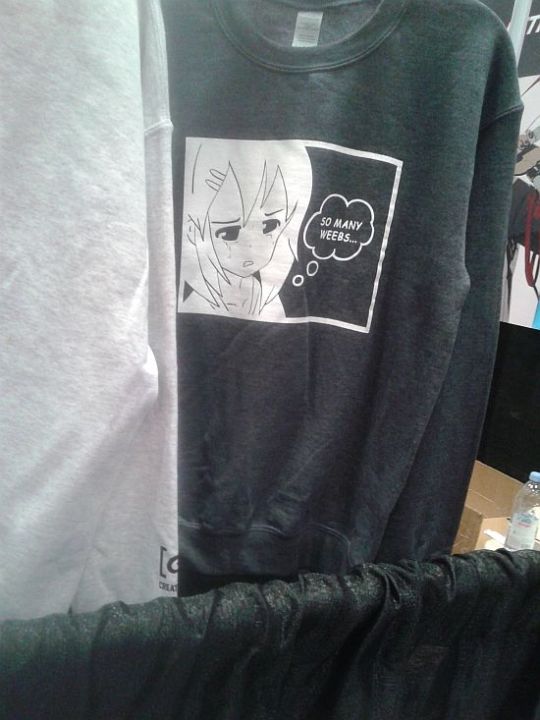
So at Anime NYC, I found a shirt that made me both laugh and cringe at the same time. As you can see, this kind of shirt does generate a bunch of reactions.
Over the past few years, I’ve noticed a lot more fans owning the term “weeaboo” and making it as a symbol of self-empowerment. This was especially true on places like Twitch, where not every video game streamer was into anime or otaku culture for that matter. I saw a lot of FeelsWeebMan, Weebs (insert positive/negative Twitch emote), etc. I remember when one notable fighting game personality talked about one of his favorite anime series on stream, the host then asked “Yo, where my fellow weebs at?” I also have friends who tell kids “Stay strong, little weeb” or try to figure out ways to explain things in the form of questions like “How do I tell my grandma that I’m going to a weeb convention!?”
I was reminded of what I wrote about Japanophiles many years ago and since then, I noticed how much fans have started to be proud of their “weeb”-ness despite its negative tone.
To tell you the truth, I started calling myself a weeb for fun over the past couple of years. My otaku friends were using it in ways to make jokes about their love for all things anime. I wonder if they used that humor to cope with whatever insecurities they have. Labels of any kind are powerful. They aren’t necessarily good or bad. It’s what you make of them that defines what they morally represent.
So I decided to get the shirt at Anime NYC after much temptation and the fact that I didn’t get to buy anything (yet) due to helping out Anime for Humanity at the convention.
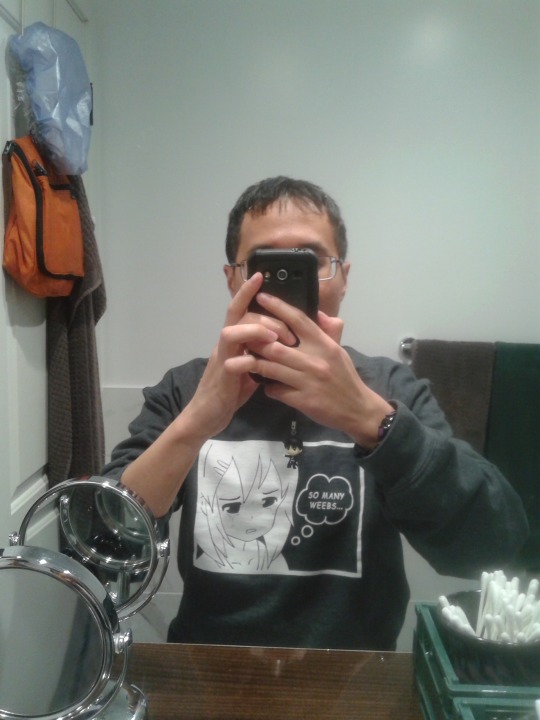
I was told by the seller that the girl on the shirt was crying tears of joy, not sadness. Maybe yes, maybe no.
Thinking about the positive usage of “weeb” reminds me of how language is policed in mental health communities. There’s this whole thing about using person-first language where it’s better to say something like “Oh, this person is living with depression” versus “This person is depressed.” There’s concerns that the latter statement will cause others to think that one condition entirely defines the person which stigmatizes them. While this is a good concept, person-first language doesn’t really address the structural problems that make people’s lives hell. All it does is give a shiny sticker to someone who needs more than that. I’m sure someone who gets told that they’re more than just one label would appreciate it during a time where they need meaningful support to deal with whatever’s bothering them, right?
A mental health advocate once said that we’re all so focused on what words we use when there are people dying out in the world. Hearing about policing language makes me wonder what exactly are certain advocates trying to fight for. Are they just going for easy things that are quick to implement like changing language versus changing an entire system (which takes so much time and doesn’t provide an immediate reward)?
I do think it’s fine to say that you’re a weeb because you get to define your own identity without interference from outside opinions. There’s so many advocates/experts/activists that define or want to define other people’s identities. They do have good intentions. But once those advocates get a taste of power and significant mainstream support, they want to make sure their influence doesn’t go away and the focus becomes more about them than the people they really need to help.
The thing is that a label that’s negative or associated with negativity (depression, weeaboo, etc.) will always be negative even when you find the silver lining or put some pseudo-positive spin on it. Saying that I have depression compared to I’m depressed doesn’t really make me feel that much better about myself. I’m sure people who’ve been through mental health problems and grown have acknowledged how much their emotional pain has affected their lives.
It’s weird to say “Oh, he’s/she’s/they’re someone with a huge interest in anime/manga.” compared to “He’s/she’s/they’re otaku/weebs.” I find it insulting to say a statement like “I have a huge interest in anime and manga” when you’re an extremely passionate anime and manga fan. It feels like a straight-up denial of a big part of your identity. Obviously, not one thing is all about you, but some things do take a bigger space in your identity than others. There seems to be a huge shame factor in all of this and I’m glad a decent number of otaku are throwing piss at that shame.
Prioritize self-acceptance over acceptance by others first and foremost. True acceptance is accepting all the major and minor parts of your identity.
We’re really living in a golden age of anime fandom and we can’t take that for granted. As we’ve seen with what happened with Kyoto Animation this year and the growing supply/demand issues involving animators, life will continue to hit us with tragedy and uncertainty.
So to my fellow prideful weebs out there - weeb it out, y’all. Let those otaku tears come and cherish the emotional experiences that anime/manga have provided to fans for decades. Taking claim of your label/self for the better is similar to how an anime/manga protagonist fights their own inner bias to help themselves and those around them. It’s also okay if you grow out of anime/manga fandom as long as you’ve accepted your otaku experiences for what they were to you at the time.
Besides, in a world where people are taught to constantly hate themselves, doesn’t taking whatever label was thrown at you by someone else & facing it head-on in assertive fashion sound like a much-needed feel-good anime/manga story for our time?
5 notes
·
View notes
Photo

Creative Limitations.
“The media’s already polarizing enough; I guess I’m looking for things that are not polarizing and are much more nuanced about the human condition.” —Lulu Wang, writer and director of The Farewell.
One of the highest-rated films of the year, Lulu Wang’s The Farewell stars Awkwafina as Billi, a fictionalized version of Wang herself, in the story of a family in cahoots to keep their matriarch in the dark. The film is based on “a true lie”: Billi’s paternal grandmother in China, Nai Nai (played by veteran Chinese actress Zhao Shuzhen) has cancer, and the family chooses not to let her know, instead staging an elaborate fake wedding to bring the family together.
Where other independent features often develop out of a short film, Wang took her story to This American Life, a bastion of American radio storytelling. The half-hour audio version, ‘What You Don’t Know’, is what her American film producer heard; from there, the feature film came to life. It’s a quietly powerful story that has resonated with Letterboxd members for many reasons, including the authentic, hands-off way in which it comments on “the many micro-tragedies that naturally follow any family whose members—for one reason [or] another—decide to leave the family nest and search for happiness abroad”. For others, it’s even more personal: “Seeing yourself on screen probably doesn’t get better than this.”
When The Farewell opened in US cinemas in July this year, its per-theater box office average topped that of Avengers: Endgame. The film was still showing in select theaters in October, and has just been released on streaming services, including in 4K on iTunes, with a commentary track by Wang and her director of photography, Anna Franquesa Solano. “We tried to talk a lot about process, so I think that’ll be interesting,” Wang told us. (Also, “we may or may not have been drinking”.)
In time for its streaming release, we chatted with Lulu Wang about aspects of The Farewell’s production, the useful limitations of independent filmmaking, and her favorite films, from holiday movies to best soundtracks. Interview contains plot spoilers.

Lulu Wang and DP Anna Franquesa Solano on the set of ‘The Farewell’. / Photo: Casi Moss
The Farewell is standing strong in our highest rated films of 2019, and the reviews are responding to exactly the things, I imagine, that were important to you: the non-manufactured stakes, the family realness, a sense of the specific being universal, the process of grief beginning long before a person you love dies. How does it feel that your film is being so well received?
Lulu Wang: I fought really hard to tell the story in such a specific way that in some ways I think my biggest fear was that the specificity would put us into a niche, and only attract a very niche audience. So, you know, the fact that there’s so many people—Asian-Americans but also non-Asian Americans—who see themselves and their family in the story is incredible to me.
You often mention the films of Mike Leigh when talking about highly specific stories that nevertheless have a universal resonance. Can you talk about some other such films and filmmakers that do this for you?
Well, Yi-Yi [directed by] Edward Yang is one of my all-time favorites. The specificity, the tenderness of it. The patience of the filmmaking. I find Yi-Yi to be that. Also the humor, there’s so much charm and so much humor in it, it feels just so real.
Kore-eda’s films speak to me in that same way. I just really appreciate the patience in filmmaking. I think so often nowadays the flashiest things get the most attention, and we’ve also trained our brains to need that, right? That kind of stimulation. And so there’s something just so beautiful about a film that takes its time and that doesn’t lean on easy tricks to get attention, but that takes time to get to the heart of something very nuanced, that isn’t so obvious, that isn’t so black and white. The media’s already polarizing enough; I guess I’m looking for things that are not polarizing and are much more nuanced about the human condition.
Through The Farewell’s run, you’ve been generous about opening up the filmmaking process—this Vanity Fair bilingual script breakdown, for example, gives a good insight into how hard you worked on the script. Could you talk us through the ‘wedding portrait sequence’, in which Billi’s cousin and his wife have a series of photographs taken while Billi and Nai Nai carry on a long conversation? It’s entertaining, but it’s also important for what it reveals about Nai Nai and Billi’s relationship, Chinese wedding culture, and the underlying lie of the whole story. You must be so proud of this sequence.
I am. Yeah, I’m really proud of that sequence. The photo portrait was kind of inspired a little bit by Secrets and Lies, when he takes the portrait, and the falseness of what we present when we take portraits like that in the studio, right?

Nai Nai (Zhao Shuzhen) observes yet another wedding portrait set-up in ‘The Farewell’.
One of the intentions, going through it, was minimising the dialogue and trying to condense the script, and so that made me say, “Okay, what are all these moments doing?” They’re all trying to do the same thing, which is to establish the relationship between Billi and Nai Nai, so condensing it into one sequence makes sense. And then also because so much of it is dialogue-driven, how do we make this cinematic? Because at one point the wedding photography studio was separate from these conversations between Billi and Nai Nai, you know, and so this is where, in some ways, being forced to have limitations, being forced to make a shorter film, you start to think more about layering and how do you do multiple things at once.
I really appreciate the limitations of independent filmmaking. Not always; when I’m on set and I get the budget I’m complaining! But looking back on it, those limitations are how we came up with many of our visual ideas. And then also of course it was influenced by the location itself, because we were scouting wedding studios and I wasn’t aware that these studios were so large, that they have, like, different spaces built into the same building. Because if you look at a western photo studio, like in Mike Leigh, right, it’s always the same backdrop.
So that sequence was inspired because we went location scouting, and we were like “this is ridiculous! There are ten different rooms and they all have different set ups!” So then we had this idea of them basically just wandering through the whole photography studio and we’d pick four of our favorite set-ups.
And then this idea of them being silhouetted was inspired by [Woody Allen’s 1979 film] Manhattan. I wanted to capture their relationship as a romance, and I was thinking about Manhattan and their silhouette—I think they were in a planetarium—so we came up with this idea of a continuous conversation, but that was spaced out in front of different backdrops.
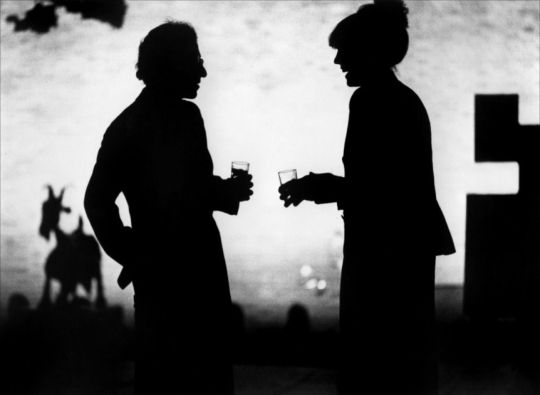
Woody Allen and Diane Keaton in a scene from ‘Manhattan’ (1979).
That sequence helps us learn more about who Nai Nai was before the events in The Farewell take place. At Letterboxd, we’re often compiling top ten lists, but “best grandmothers on film” is not a highly populated category, especially films where grandmas are more than just ‘kindly’. Tell us more about fleshing out Nai Nai’s life and the importance of giving respect to older female characters.
I think about that in life, too, you know. We think about a lot of people in our lives as fulfilling a particular role in relation to ourselves. That’s my mother, that’s my grandmother, that’s my teacher. Remember as a kid you don’t even think your teacher goes to the grocery store! They hide in the back of the class and then pop back up in the morning! So as a filmmaker, as a storyteller, I’m always thinking about who they are, separate from the context of their relationship to you.
That’s also part of the sadness of not being with somebody or of losing somebody is you don’t necessarily get to see them in all those different contexts and then when they’re gone, there’s so much you don’t know about them and may never know about them. And as our parents get older, your relationships to your relatives change, you know, like ‘who’s the parent?’—children often have to become the caretaker. That’s where it came from, was wanting to make sure that Nai Nai was not presented as a stereotypical grandmother. That she felt like a three-dimensional woman, a woman who was once a girl, and a young woman, someone who was once in love, or maybe in a relationship out of convenience. And also that she’s not always sweet. That’s very real.
One of the motifs in The Farewell is birds appearing at significant moments. In many cultures, a bird is a portent of something big, for example, a death in the family. Where did your bird come from?
The bird for me came from wanting to put [in] something magical, but not, like, literal, you know? Meaning, I wanted to insinuate spirituality and magic, but I wanted it also to be interactive with the audience, so based on what they believe and how they interpret that bird is the meaning they get out of it, without me saying “this is what it means”. Much of the movie is about belief systems and perspectives, so I think that if you believe the bird means something, then it does. But if you don’t, and you’re a much more literal, scientific person and you go, “Oh it’s just a bird, it’s just a coincidence,” then it doesn’t mean anything.
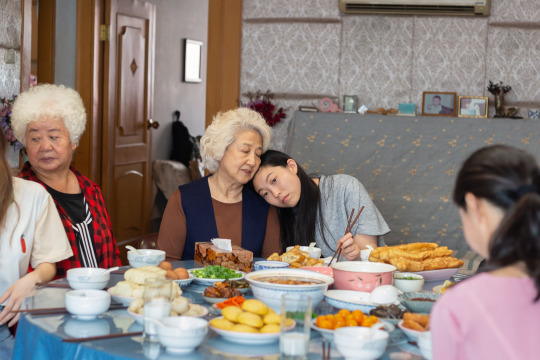
Awkwafina leans on Zhao Shuzhen’s shoulder during filming. / Photo: Casi Moss
That’s how it is in the movie and that’s how it is in life: what you believe, and where you find meaning, becomes your reality. With Nai Nai outliving her diagnosis, the people who believe the lie is what worked will continue to believe that the lie is what worked, and people who believe that prayer is what worked… In a way, we look for signs to validate the things we believe, because it’s how we get through life! We need signs, we need meaning, even if we’re the ones who are attaching that meaning.
This far down the track, what is your fondest memory of the production period?
Oh gosh, so much of it. I think just being in China, being in spaces that were in my real life, with a crew. Any time that that happened it was really emotional, like shooting in my grandmother’s neighborhood. Shooting at my grandfather’s real grave. I hadn’t seen my grandfather since I left China when I was six, because he died a few years later. To now be at his grave site, gathered there with producers and the crew, scouting it and then shooting there, you know, it was an integration of two different parts of my life that I always felt were really separate, which was my family and China and my background and culture, and then the other part of me, which is being an American, being a filmmaker in America.
In many ways, I always felt that my family didn’t understand what I wanted to do, and also I couldn’t bring who I actually was into Hollywood, there wasn’t a space for that. With this film I was able to fully integrate, bringing my American producers to China for the first time, having my grandmother come to set and see me directing with all the lights and camera and crew. Having my parents be part of the table read. It just felt, really, like I was creating from a place that felt true and real and grounded to me.
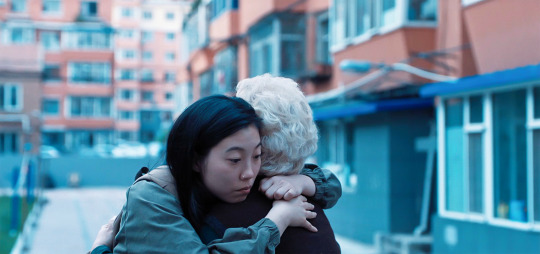
Awkwafina and Zhao Shuzhen in a scene from ‘The Farewell’.
Speaking of being grounded, what’s your go-to comfort film? The one you’ll always throw on on a rainy day?
Oh, I know: The Philadelphia Story. I love that story.
What’s the film you’ve probably seen the most?
The Sound of Music.
Favorite song from it?
Probably ‘Edelweiss’, honestly. I’ve been watching that film since I was a kid, it’s one of my parents’ favorite films. It’s such a family film for us, and every time the father sings ‘Edelweiss’ to all the kids, I get really emotional.
What’s the film—or films—that made you want to become a filmmaker
Secretary. The Apartment. Annie Hall. I know that’s taboo, I shouldn’t say that, but I have to. Like, Annie Hall, you know? When I first saw it, I was really inspired by that. And The Piano. I think, with both The Piano and Secretary, it was the exploration of female desire and female voice—and obviously as a trained classical pianist since the age of four, the symbol of the piano for her, for that character, and for me, was really meaningful.

Jane Campion’s ‘The Piano’ (1993).
Alex Weston’s soundtrack for The Farewell, which leans heavily on human voices, is something you worked closely with him on. What’s your all-time favorite film soundtrack?
So many, I don’t know how to choose! Well, I have a couple. In the Mood for Love. And then, because it is related, Barry [Jenkin]’s If Beale Street Could Talk is one of the most astounding soundtracks. Barry was inspired by Wong Kar-wai for Moonlight, and so yeah, thinking about In the Mood for Love reminded me that Nick Britell’s If Beale Street Could Talk soundtrack is just incredible.
Holiday season is fast approaching: what’s your favorite holiday/Christmas film?
Home Alone is a classic that we all watch. Does Fiddler on the Roof count as a Christmas film?! I don’t know. That’s my mom’s favorite. And then I have a really embarrassing one, because when we got sick of Home Alone, we had to pick a new one, and somehow we landed on Jingle All the Way. For years, we watched Jingle All the Way and just laughed our heads off.
Finally, how is Children of the New World coming along?
Very slowly. I’m working on the script. I’m writing it. It’s gonna take a while, probably after all of the press is done so I can fully focus.
‘The Farewell’ is available on streaming services now. Comments have been edited for clarity and length. With thanks to A24.
7 notes
·
View notes
Text

An answer to this ask sent to me by desmondneedshisscalpel.
Okay, so keeping spoilers up to chapter 40 because I don’t want to spoil the whole series for some people. Basically, thematically both Krone and Mama are examples of failed adults in a narrative that is primarily about children growing up in a world where they’re not allowed to grow up on their own terms or even live.
SPOILERS UP TO CHAPTER 40 FOR THOSE WHO JUST WATCHED THE FIRST EPISODE OF THE ANIME.
Before I get into the thematic ramifications of this let’s analyze their names. Mama Isabella and sister Krone! We’re introduced to Mama as the perfect loving mother figure. Somebody who is a mother figure to everybody in the orphanage out of selfless devotion and executes perfect maternal care.

See, the mother, the matron and the crone. (Man almost like Sister Krone’s name is referrring to something specific) is an idea in Jungian psychology. Jung in analyzing common themes of mythology noticed a pattern on how female goddesses tended to present themselves. An archetype, or archaic patterns and images that derive from the collective subconscious. Characters we’re all meant to recgnize that show up in stories agian and again. Right now in the panel above, Mama Isabella is acting as a “Mother FIgure” or a “Mother and Child” motife of interaction that most people will recognize on sight because they’re trained to recognize that archetype.
So we get to the triple goddess archetype, the mother, the matron, and the crone.
n 1949 Jung and Kerényi theorized that groups of three goddesses found in Greece become quaternities only by association with a male god. They give the example of Diana only becoming three (Daughter, Wife, Mother) through her relationship to Zeus, the male deity. They go on to state that different cultures and groups associate different numbers and cosmological bodies with gender. "The threefold division [of the year] is inextricably bound up with the primitive form of the goddess Demeter, who was also Hecate, and Hecate could claim to be mistress of the three realms. In addition, her relations to the moon, the corn, and the realm of the dead are three fundamental traits in her nature. The goddess's sacred number is the special number of the underworld: '3' dominates the chthonic cults of antiquity.
So obviously we see in relationship to the children around them, we have one person presnting themselves as the perfect mother figure, and the other presents herself as the dangerous, suspect woman, the crone in sister Krone. This entirely has to do with the fact that these women are not acting as themselves, they’re playing a role assigned to them by the system they are in. It present even in their naming (Isa Bella) the beautiful mother, and Sister Krone the suspicious crone who is not a mother quite yet and therefore a crone sly and conniving trying to prove herself. It’s literally referred to in cover art, that both of these women were only playing a role assigned to them in a tragedy. Pick a role, be faced with doing something you do not want to do, and then cry.

So now that that is out of the way onto thematic talk. So, the heart of the entire series is Emma, and we’re supposed to believe Emma’s beliefs are the right one and Emma’s primary belief is that no matter what you should fight against the cirucmstance you’re in, and not only that you shouldn’t only fight to save yourself but you should fight to save everyone around you. Realism, survival, that comes seconds to the ideal of saving everyone. If the situation is weihted against you you should fight to overcome it. In the very first chapter, Emma sees that she’s alone in the world, that no adults are going to help them and they’re up against monsters they can’t possibly understand and her first insinct is not to escape for herself, or just herself, norman and ray her two most precious people but instead they all have to survive and they all have to escape on their own and rise to ovecome the system. Of course Emma possesses and extraordinary and naive amount of optimism, but Emma is the heart of the series she’s the one who carries the message we’re supposed to read and the ideals the protaognists are fighting for.

Those ideals are: You can’t give up. You can’t give up on yourself, or others, and even if the entire world is fighting against you you still have to fight back with everything you have not only for your sake but the sake of others around you.
In a truly shonen sense of the word, The Promised Neverland is about not giving up.
The children with little to no help from adults are fighting against an unkind world, that is rigged against them, and encourages at every aspect for not only for them to not be seen as human but for others around them to not be seen as human. Every single character is present in a dehumanizing system.
The adults are those who have given up and simply decided to play as a cog in the system. They’re playing their roles without challenging it, because they’ve given up and only started to care about their own survival. The most important part to remember is that every single adult that is currently a part of the plantation system like Mama and Krone started out as kids in the plantation.
They come from the same background as Emma, they thought they were living happy lives only to find out that they were just cattle being raised and the adults that loved them were actually manipulating them. They all reacted to this revelation and realized that the entire world was going to try to kill them and had already dehumanized them and seen them as cattle.
So every adult is also in a sense, trying to survive the same way Emma is. The difference being that Emma’s ideals are transcendent, she wants to fight back against the system and also provide a better life for the others around her. The adults have stopped thinking about others surviving the system, they’ve given up fighting in any significant way and instead care only for their self survival and therefore they condemn others to the same cruel fate they once went through themselves.

So Isabella and Krone are just performing in roles, they’ve been utterly dehumanized by the system to fit that role but they also had a choice in this thought a weighted choice in that and they only chose to fight back in ways beneficial to their own survival. They were broken by the system and gave up. They’re adults in age and name only, they never truly grew up and tried to trasncend their situation in any way. They’re still cattle in a way, they’re just sheep dogs instead of sheep themselves.
The story argues again and again that while Emma’s ideal is highly idealistic, it’s the ideal people should be striving for.

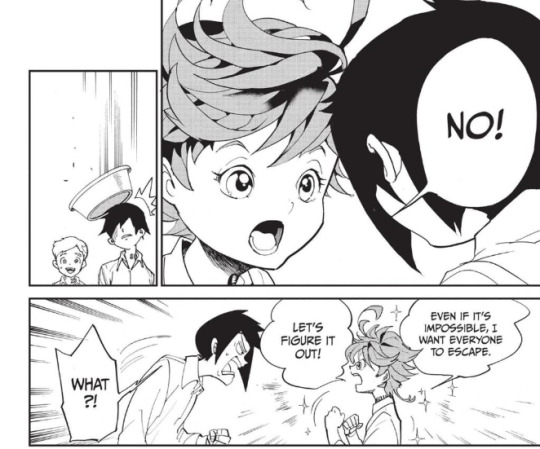
That they should start by thinking they want everyone to escape and work their way from their, even if it’s insane, even if it’s risky. if the world is rigged against them then they have to change the world.

That’s how the trio has always functioned, it’s Emma’s ideals that drive them, Norman tries to get Emma and Ray’s different ideals to get along and make Ema’s ideals a reality, and Ray is the cyncial one who will sacrifice himself and do the dirty work.
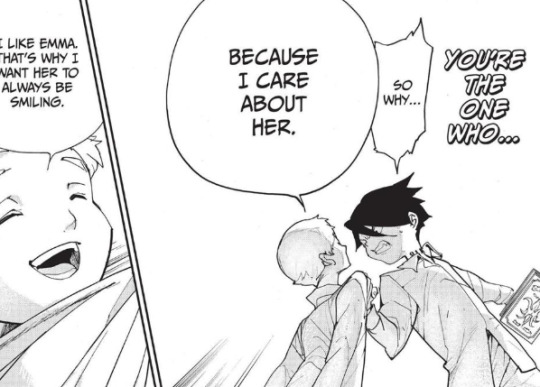


The manga argues that this is the right way to think, the views of every antagonist is challenged against Emma’s view that if the world is wrong they should chane it, and you should start by doing everything in your power to save everyone around you and work from there.
So we see what is revealed in Krone and Isabella’s flashbacks. They were raised in the same system, but they chose instead of trying to escape the system or reform it, to just thrive inside the system by stepping on those around them. Krone and Isabella’s reactions even then are different. Krone sees this as a compettition and that she has to directly destroy Isabella in order to take her place, she doesn’t really even factor in the children she’s taking care of except as pawns.

Even these adults who have given up fight back against the system in their own way, but the adults are self absorbed and really only care about making their own stand. Their own survival becomes their top priority. For Krone, she absorbed the lessons of the system around her to “compete” “Compete” she gave up on the idea of escape and instead chose to fight with Isabella for the more comfy position of Mama. Even though in the end she’d still be a victim of the same system, just a victim with slightly more power over other victims. In the end her way of fighting back only thinks about her own survival, and she’s also given up on the idea of escape a long time ago instead taking the lesson that she could not escape to heart. Krone genuinely viewed the only thing she could do was struggle until death, that it was the only thing she could accomplish with her meager life born into this terrible system.

Then we get the second failed adult Isabella and she’s actually given a lot more depth to her character in the final moments of her arc. First once again the mention that they’re acting and putting on roles, and what Isabella considers the performance she’s given to the children as a separate entity from the real Isabella.


However, the lens that she’s just acting, the lens that this is a tragedy where she has to perform a role that’s all just a narrative that she’s imposed herslef on reality to distance herself form her own actions. The truth is you become the mask, both of those things are the real Isabella. The kind motherly figure that tended to the children, the cold woman who manipulated the children, those are both actions that she took, those are choices she made. You are in the end the summary of all your actions and choices. However, Isabella was so good at becoming a part of this system she was able to compartmentalize herself like that, and assume that all of those different parts of her was just different roles she was assuming.

The thing is Isabella isn’t lying here, and that’s what makes her actions all the more horrifying and also all the more human. What Isabella advocates is the opposite of the themes of the manga, and the opposite of the ideals Emma gives. That they should be complacent and accept their ignorant, happy lives, because that’s the only way they can be happy. They should just try to hoard that small amount of happiness instead of fighting a battle that they would lose.Once again what Isabella advocates for is giving up and only focusing on your own personal happiness for as long as it can last because the world is too tough to fight against.
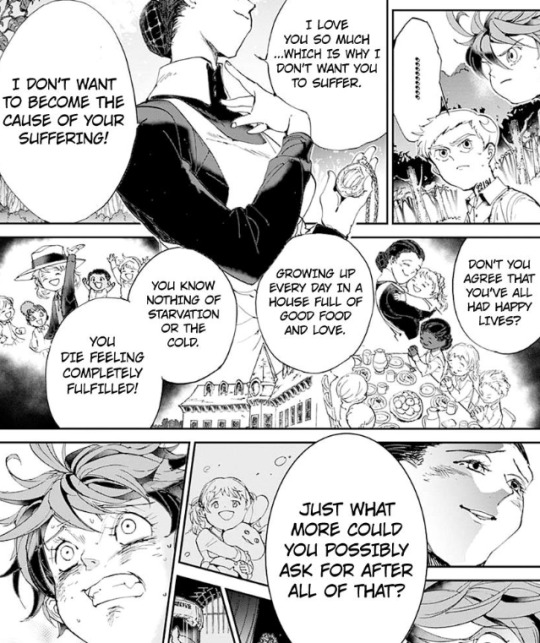

And Norman advocates the opposite of that. That they have a right to live, that it’s wrong for them to be born to die as cattle.

As we go further on we see more and more of Isabella’s intentions. Her love for the children isn’t a lie, she actually did care for Emma, and she showed that care by wanting Emma to survive in the only way she knew how to survive. She’s advocating they give up like she did, because she genuinely has given up to the point where she doesn’t think there is escape or survival. Her attempts to groom them into cattle are really just her believing that them making the same mistakes she did and giving up as she did is the only way to move forward.
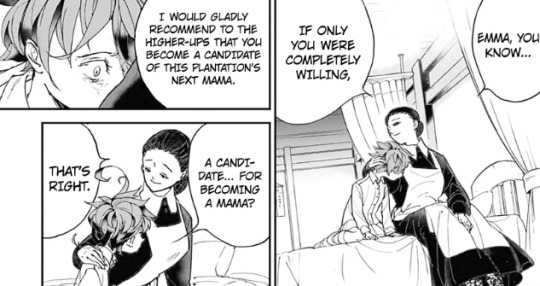

Again and again, the adults encourage the children to stop struggling against their situation, to instead care for their own feelings, their own survival, to stop thinking and let their minds be at ease because there’s nothing to gain from that struggle. But that’s not the truth, that’s just the path the adults chose to take. That’s just them projecting their failures onto the children.
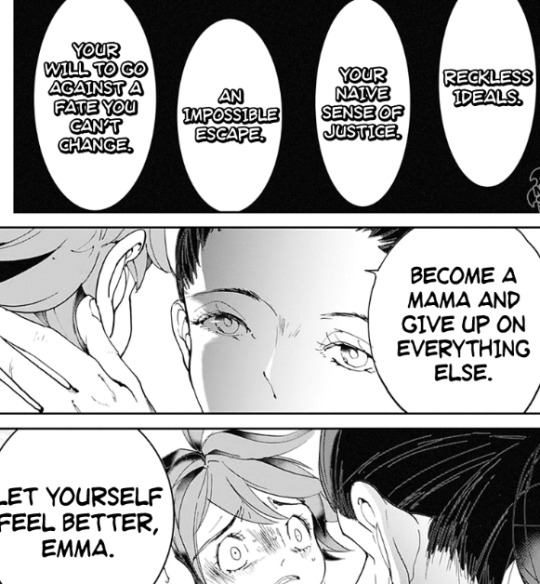
Why does Isabella so perfectly switch between being a caring mother figure and a ruthless manipulator, it’s because she’s given up and stopped thinking about it entirely. She doesn’t feel her emotions, she doesn’t think about what she wants, she just acts as a cog in the system, without hesitaiton, without faltering, because those are what a human does and she’s stopped seeing herself as human a long time ago.
In this manga giving up is the ultimate evil. It’s what leads the victims to become victimizers and we finally see that in Isabella’s reveal.Isabella was Ema, not only that but she had a Norman, she realized the truth of this world early and gave up.



Isabella and Emma are presented with the exact same situation, not only that but they’re a heart very similiar people. They’re geniuses who despite being smart tend to only think about things with their emotino and at their heart are driven by the loe they have for life and the people around them. Isabella genuinely loves the children and thinks this is all that she can do for them, and that’s what makes her all the more monstrous. Because isabella and Emma were both shown the wall, shown escape was impossible and given a choice on how to react, and Isabella chose to give up and Emma didn’t.
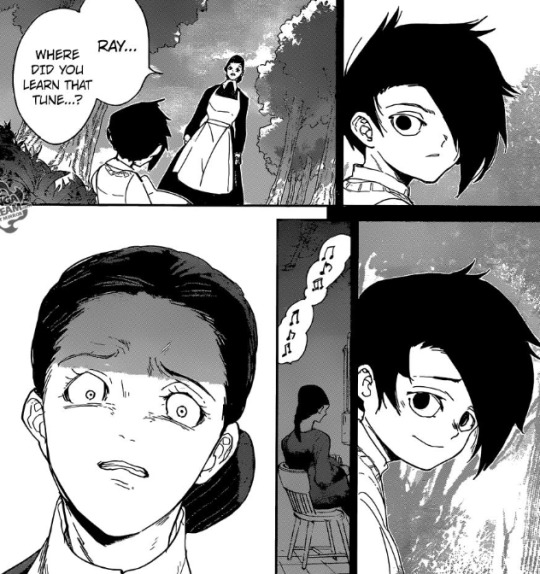
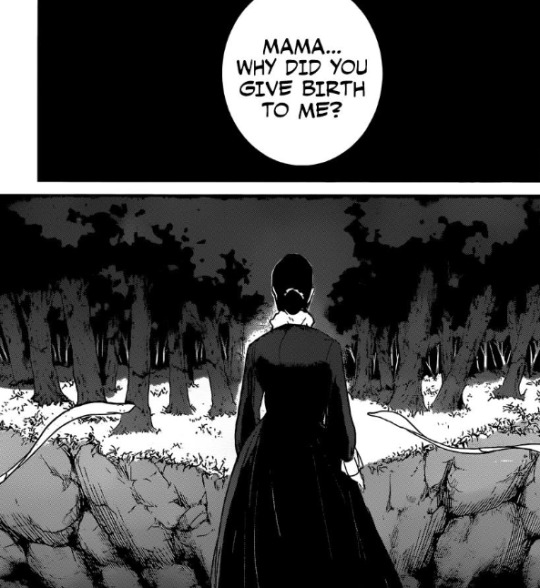
And here we see it the ultimate challenge to Isabella’s quiant little ideology, that this was all she could do, that there was nothing to fix this world and nothing she could have done to make the situation better.
If that was so.
If that was so.
Then why did she give birth to Ray?
She’s Ray’s biological momther which means she made him into a victim of this system, and she chose to have him born into the exact same world that she sees no escape from its fundamental evil.
At that moment Isabella’s act falls apart and we see true emotions on her face, the ones she was suppressing all along for the first time in the series. Just like the rest of them no matter how much she dehumanizes herself to play a role in this system was undeniably human as well.
And the answer of course is that as much as Isabella does genuinely love others, in the end she was only thinking about herself and her own survival.
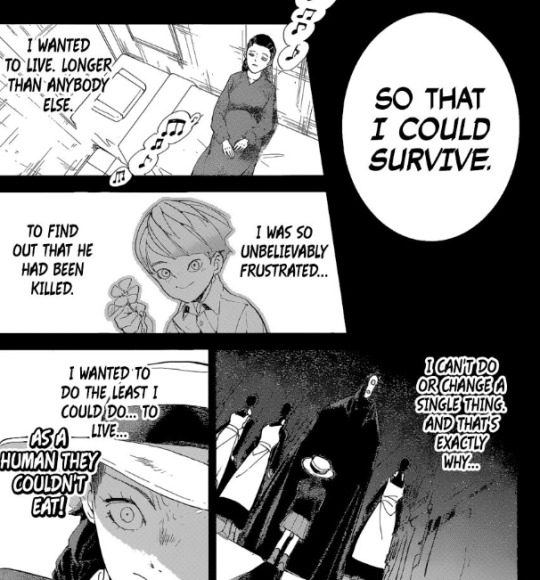
And the resolution of Isabella’s character is that she admits she was wrong, that she lost. Her deepest desire really was to love those children normally, but if she had thought of something other than her own survival then she could have aided in their escape. She could have been a proper adult to those children as we see later on in the series, real adults who do learn that exact lesson and learn to put children and others first before themselves.
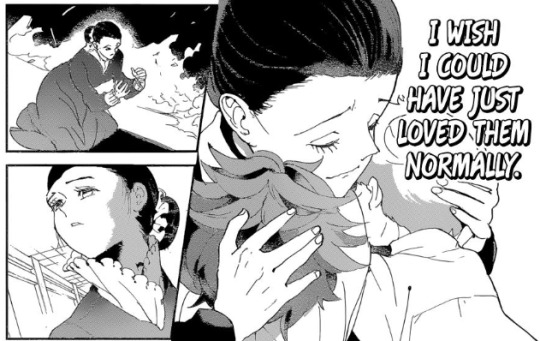
Isabella is a victim in the same sense as Emma, but she chose to give up and create more victims rather than fight for others, because in the end she was only concerned about herself. And because of that she admits.
That her love was twisted. That she did nothing for those children in the end. She was denied her most fundamental wish that she could not love them normally because she did not choose to fight for those children but rather herself.
If she had not given up, if she had been convinced not to give up even now, then imagine what a great ally she could have made for their escape. However that’s not the woman we see at the end of this arc.
Just a woman whose thoroughly given up and lamenting the fact that she could not be any better than the system that made her in the end.
211 notes
·
View notes
Text

Is that ESTELLE MACMILLIAN? It’s so nice to see them back at Hogwarts! SHE is 17, and a HALF-BLOOD, 7th YEAR HUFFLEPUFF and totally looks like the muggle CAMILA MENDES. They are known to be CONFIDENT, and METICULOUS but also have a tendency to be HAUGHTY and DUBIOUS. There are whispers around the castle that in the unrest that is brewing they are NEUTRAL.
OTHER INFO: She’s ¼th Veela.
Full Character Name: Estelle Fernanda Macmillan
Does your character have siblings? What are their names?: She’s an only child.
What is your characters best subject in school? Surprisingly? Herbology.
What is your characters wand?: Come back later, I need to do the test on Pottermore. rgnsrlgk
Can your character cast a Patronus? What is it? What memory do they use?: She is noncorpeal right now, the shape it would take if she were able to is currently unknown.
Who is your characters best friend?: She doesn’t have one, I’d like to plot one out for her though!
Does your character look up to anyone? Who?: Other than herself? Her late mother, who put the stars in her sky. Her father is also quite important to her.
What is your characters relationship like with their family?: The only immediate family she has left is her father, who dotes on her like you wouldn’t believe. Stella is incredibly spoiled, and it couldn’t be more obvious. He’s a good man and a good father, which shines through in how he takes care of his daughter.
If your character has siblings, do they have a favorite?: N/A
What is your characters go-to spell in a duel?: Incarcerous
What spell does your character use most often?: Wingardium Leviosa, so she doesn’t have to carry her books to and from class.
BIO/HEADCAONS:
TW: parent death, mental illness, manipulation, suicide mention.
She’s Mr. Ernie Macmillan’s daughter, so that’s fun. Strap in lads. Her parents met when the schools came together for the triwzard championship. He asked her to the Yule Ball, which originally started as a plot to get back at respective significant others (or, in his case, to rub Hannah’s nose in it bc………how dare she not go w him?) but stranger things have happened.
They fell and love and it was definitely a whirlwind relationship. They spent their summers following split between Scotland and France. They were married as soon as the war ended, and after Ernie came back to repeat his seventh year, he made the move to be with her and to work under his father-in-law at the French Ministry of Magic. All was well and good for them; they lived happily and were over the moon when Estelle came along.
She was born with a silver spoon in her mouth and wanted for nothing. Literally, the girl could not have been more spoiled. She STILL is.
Her mother was a Cursebreaker so she got to experience all sorts of things in different magical communities. She’s quite cultured as a result. She speaks French (which is her mother tongue), English, Spanish, and some Greek.
This bitch had it made up until second year. She was yanked out of class near the end of term and shipped home without given any information. It wasn’t until later that night that her dad sat her down and did his best to explain why her mother was no longer with them.
A few blood purists were unhappy with the fact that Ernie gave up his pureblooded line and decided to mate with someone beneath him (not to mention the fact that he’s always been on the light side and even fought in the war prior).
So, naturally, they stuck their nose where it didn’t belong and found out that Mrs. Macmillan suffered from mental illness. They decidedly used that to their advantage and began manipulating her. Eventually it ended up being too much for her to handle and they drove her to suicide. Her father never told her the more gruesome details to spare her the heartache, only that she’d died tragically.
So, ofc she’s in the dark about the true circumstances and has no idea how/why she’s lost her mum.
OK ACT II HERE WE GO.
Her father couldn’t handle staying and being so close to the tragedy, so away they went. Enter in her being forced out of her childhood home and being made to move to dirty Scotland, tbh.
Transferred to Hogwarts from Beauxbatons in the middle of her third year. She absolutely despises the school and (most) of it’s inhabitants. Isn’t apart of any clubs or even on the Quidditch team because she can’t be bothered, she’s well and truly tired of everything.
Neutral as fuuuuuck, definitely hasn’t picked a stance in the impending war. Decisions? Don’t know her. 100% in it to protect her money and her own skin, basically. Has tendencies towards the good side bc she’s not a monster, but she’s….not great, either. Very morally grey.
Doesn’t much like that she’s halfblooded; and by that I mean she hates it. CANON DIALOGUE: I’m part veela, so that basically cancels out the halfblood ///:
2 good 4 u. Pompous, self-important, the list goes on. Probably scares people bc they never know what the fuck she’s going to do. A Reckless Nightmare ^TM.
i left out so many things this is rly only scratching the surface but uhhhhhhh, I’ve talked a lot so come love my trash baby she needs friends.
P.S. If I missed any triggers with the darker bit of her bio, pls let me know!
3 notes
·
View notes
Text
Top 10 “Alfred Loves Haplo” quotes, ranked
When I made this post I promised a sequel and so here I am, delivering. Standard disclaimer, this is a (very) non-inclusive list, and also order is not to be taken too too seriously.
Anyway. Onward.
10. Seventh Gate, Alfred almost kills people because he’s so worried about Haplo
All he’d been able to think of was killing. And he’d actually considered it!
It’s this world, he decided, horrified at himself. This world of death where nothing is permitted to die. That and the battle in the Labyrinth. And his anxiety, his soul-wrenching anxiety over Haplo. Alfred was so close to finding his friend, and these—his enemies—were blocking his way. Fear, anger…
It says a LOT about how effusive Alfred gets about Haplo that a quote about him literally almost killing a bunch of Patryns because he’s just that desperate to get to Haplo is the quote I put at the bottom of the list. Like. This is the dude that basically gave himself a handicap to avoid even the possibility that he would ever use his magic to hurt other people.
(Unrelated, but you can’t tell me that Haplo wouldn’t be ridiculously into the fact that Alfred was that worried about him. Being so devoted to someone you’d be willing to kill for them has got to be a huge turn-on in Patryn culture, right?)
9. Fire Sea, Alfred heals Haplo
The circle between the two was truly forged, truly complete. And Alfred knew, with a feeling of overwhelming sadness, that Haplo would never forgive him.
I like this quote because of the sense of tragedy in it. Up til now, Alfred hasn’t exactly said that he’d quite like to be Haplo’s friend, actually, but there are a lot of mentions of how lonely he is, how he feels a connection to Haplo and refers to him as a friend before quickly thinking better of it, how he wants to believe that Haplo has good in him, and so on, and all of those leading into this moment where Alfred realizes he can’t let Haplo die. Alfred already cares enough about Haplo to follow Jonathon and Jera into danger to save his life, but more than that, he cares enough about him to be deeply saddened by the idea that Haplo will hate him for it. He just wants a friend, dangit!! That’s the tragedy of it!!
Also, that’s not even touching the whole “forging the circle between them” thing. Which is… wow, that’s a thing.
8. Serpent Mage, Alfred makes a scene in front of the Council trying to talk to Haplo
Alfred was concentrating his attention on the Patryn and the dog, but he was also uncomfortably aware of Samah, who was watching the entire incident. Alfred recalled the words he’d just said to Haplo, realized how they must sound to the Councillor, foresaw more questions, more interrogation, and he sighed heavily. For the moment, however, none of that was important. What was important was the dog… and Haplo.
After almost a whole book of Alfred desperately trying to fit in with the Chelestra Sartan and knowing full well that Samah will be watching how he interacts with Haplo, the fact that this whole section is like. All Haplo really does is show up, look at Alfred, and Alfred does an anime blush, exclaims to Haplo about this blasphemous experience they had in the Chamber of the Damned, then realizes how much he screwed up only to go “well, getting the dog back to him is more important right now.”
As its own quote it’s not all that much, but like. The context, man. Alfred knows what the dog is, more or less, and knows that it’s Very Not Good that Haplo lost it, and probably even has an idea of the significance of the dog picking him to come to, and in this moment, he decides that reconnecting Haplo with this piece of himself is more important than how he is perceived by the rest of the Sartan, including Samah, which has been his main worry for like… the whole book. That’s love, baby!!!
And we’re STILL in the bottom half of this, oh God…
7. Into the Labyrinth, Haplo and Alfred (and Marit) hold hands in Abri
Haplo held out his hand– the hand that was powerful, tattooed on the back with blue runes. Alfred extended his hand– white, shriveled, with knobby wrists and thin bones, its flesh cold and clammy with fear. The two hands met, clasped, gripped each other firmly. Two people, reaching across a chasm of hate. At that moment, Alfred looked inward and met himself. And he was no longer afraid.
So like, obviously hand-holding, and also the FIRST hand-holding, and Haplo’s just called him friend for the first time, and Haplo’s friendship and faith in him giving him courage and confidence, and also just, like, them officially being Friends and that friendship bridging the enmity between their races, and the way the whole thing is such a Moment– to borrow Ana Navarro’s words:
“The power that that has, the intelligence that that has, the clearance that that has, the access that that has, the influence that that has, the profile that that has, the international implications that that has–”
6. Fire Sea, Alfred feels a connection to Haplo
“But now we are strangers in a strange world– a world that appears to grow exceedingly more strange the deeper we probe into it.” Alfred appeared confused, almost shy. “I can’t explain myself, but I feel a… kinship to you, Haplo. Perhaps because of what happened to us going through Death’s Gate. I’ve been where you were. And I think, if I’m right, that you’ve been where I was. I’m not explaining this very well, am I?”
A great moment in and of itself, and all the better with @thatclumsysartanisbi‘s observation that the word for “kinship” they used in the Hebrew translation can also mean “attraction.” Also great in that it mirror’s Haplo’s Elven Star quote about being strangers to the rest of the world, but not to each other.
Also like, dang, who else remembers reading this for the first time and being as surprised as Haplo that Alfred isn’t viewing him as an enemy at all? That can’t have been just me, right? Like, it genuinely came out of left field for me, in the sense that I expected them to distrust each other and have to learn to get along, and here’s Alfred starting off by refuting that whole idea?
5. Seventh Gate, Alfred’s vision in the Chamber of the Damned
The Sartan’s face was handsome, strong, resolute — fine steel emerging from a forging fire. No doubts marred its shining surface; its blade was honed to a sharp, cutting edge. The young man looked familiar to Alfred. He could almost put a name to him, but not quite. Now he could. The man had been Haplo.
Alfred smiled. “I remember the feeling of elation, of knowing that I wasn’t alone in the universe, that a higher power was watching over me, caring for me and about me. I remember that, for the first time in my life, I wasn’t afraid.”
This ties in nicely with that earlier Into the Labyrinth quote where Haplo is showing up significantly in moments where Alfred is self-actualizing. Haplo and his influence on Alfred is so so connected to Alfred’s feeling loved, strong, not afraid and not alone, and this isn’t the only time that connection is made clear.
Also though, this quote breaks the top five because of the whole “Alfred gushing about how handsome and cool Haplo looks” thing, which is QUALITY.
4. Serpent Mage, Alfred watches Haplo sleep and touches his hair
Alfred settled himself beside Haplo, occupied himself by studying the Patryn’s stern face. He noticed that it did not relax in repose, but retained its grim, forbidding expression, as though nothing, not sleep, perhaps not even death, could bring perfect peace to the man. Moved by compassion, by pity, Alfred stretched out a hand to smooth back a lock of hair that fell forward over the implacable face. The dog raised its head, growled menacingly. Alfred snatched his hand back. “I’m sorry. I wasn’t thinking.” The dog, knowing Alfred, appeared to accept this as a plausible excuse.
So looking back on this I’m not sure if a Hair Touch actually happens or if the dog stops Alfred before he can actually Hair Touch, but the intent is still there either way so I don’t suppose it matters much. I choose to believe the Hair was Touched though.
Anyway, Alfred is terribly affectionate towards Haplo here, and it kind of makes me want to cry. He sees Haplo and knows how hard he’s had it and why he’s the way he is and wants Haplo to be happy??? Shut up I’m emotional.
Also… this is that scene in Little Mermaid where Eric’s passed out on the beach after Ariel saves him, and she watches him and touches his hair and all that. Right? I’m right, aren’t I? I’m absolutely correct. Do I need to pull up a picture? I won’t, but. It’s that scene. He’s even got a fucking dog that shows up at the end of that scene. Like. Come on.
3. Seventh Gate, Alfred helps Haplo and Marit speak and also loves Haplo
Her love poured out from her. Haplo’s love flowed from him, and Alfred was the fine silk through which both passed. The tragedy of their separation grieved him deeply. If he could have given them ease by tearing himself apart, he would have done so. As it was, he could only be a poor sort of go-between.
What made it worse was that he knew Haplo was speaking to him, too– to Alfred as well as Marit. Alfred, too, must find the strength to leave someone he had come to love.
If I can repeat myself: it says a lot about how effusive Alfred gets about Haplo that a quote where Alfred refers to himself as loving Haplo and compares that love to the love between Haplo and Marit without any qualification is only the 3rd top quote in this list.
And seriously, the way he talks about their love for each other is so reverent. Their love for each other is as important to him as his own love for Haplo, which is a kind of love in its own right, that he knows how deeply they’ve felt for each other and suffered over it and how much he just wants them to be allowed to finally be happy together. It’s such a selfless, complete, pure kind of love, that Alfred sees them feeling so deeply and its importance to them makes it important to him, too, his only thought is to protect it, that his happiness and love is in their happiness and love. I don’t know how to put it, exactly, but… it’s not just that Alfred ships them, in this scene, but that it feels like Alfred becomes a part of that relationship, himself. Each of their individual relationships exist and are strong, of course, but this scene in particular has always been about the three of them as their own unit, to me, and it kills me, and is right up there with my favorite scenes in the series, and somehow it’s STILL only #3??
2. Seventh Gate, Alfred thinks Haplo is dead
Alfred knew he should say something, pay tribute, homage. But words were inadequate. What did you say to a man who had looked inside you and seen– not what you are– but what you could be? What did you say to a man who had wrenched that other, better person hiding inside of you outside? What did you say to a man who had taught you how to live, when you would much rather have died? Haplo had done all this. And now Haplo was dead.
He gave his life for me, for the mensch, for his people. Each of us drew on his strength, and perhaps, unknowingly, each of us ended up draining a little of his life away.
“My dear friend,” Alfred whispered, his voice choked. He bent down, rested his hand on Haplo’s, over the heart-rune. “I promise you. I will continue the fight. I will do what I can, take up where you left off. You rest. Don’t worry about it anymore. Farewell, my friend. Fare–” At that moment, Alfred was interrupted by a whuff.
Do I have to say anything about this? Can I not just cry about it?
Anyway. Once again we have Alfred explicitly tying Haplo’s influence to him becoming stronger and more confident and “bringing him back to life.” Also more hand-holding and calling him not just “my friend,” but “my dear friend,” so now both Haplo and Marit have been “dear” to Alfred, which is nice.
But yeah that’s all I’ve got because Alfred thinking Haplo is dead after everyone else he loved has died is too much for me, thank god for happy endings.
1. Into the Labyrinth, Alfred explains the meaning of his name
“Whenever you spoke to me, Haplo, even though you called me Alfred, I kept hearing Coren. It was frightening. And yet it felt good to me, all at the same time. Frightening because I didn’t understand. Yet good– you reminded me of my past, my distant past, when my friends and family were still alive.
How could you do this? I wondered. Who are you? At first I thought you might be one of my people, but I knew immediately that wasn’t right. Yet you obviously weren’t a mensch. And then I remembered. I remembered the ancient history. I remembered the stories about the—forgive me—the old enemy.”
[…]
“Now I know what my name means. ”
“It’s just a name, damn it! It doesn’t mean anything. You said so yourself.”
“But it does mean something—to me. You have taught me, Haplo. You even said it. Not ‘chosen,’ past tense. But 'to choose.’ Present tense. Everyone else has always made my choices for me. I faint.” Alfred spread his hands helplessly. “Or fall down. Or"—he cast a guilty glance at Hugh the Hand—"when I do take action, I forget.’”
Alfred stood up very straight, very tall. “But now that’s different. I choose to be here, Haplo. You said you needed me. You made me ashamed. You had the courage to come into this dreadful place—for what? For ambition? For power? No. You came for love. The Labyrinth is afraid. Yes, but not of me. It’s afraid of you, Haplo. You have brought into it the one weapon it doesn’t know how to fight.”
Reaching down, Alfred timidly petted the dog, stroked its silky ears. "I know it’s dangerous and I’m not certain how much help I can be, but I choose to be here,” he said softly, not looking at Haplo. “I choose to be here with you.”
Freaking. This whole scene. There’s just so much.
1. Alfred connecting Haplo to his true name– the name that only people who love him/who he loves are supposed to know– from the very beginning??? And that it felt good and that he was drawn to it?? Like either he means it literally, in which case soulmate shenanagins, or it’s more metaphorical, in which case it just sounds like Alfred just had a huge crush. Either way that’s A Lot.
2. Again, Alfred crediting Haplo’s influence for helping him grow as a person, but even More because he’s letting Haplo’s (mis)translation of the name he’s always hated reshape how he himself thinks about it? Can there be anything more intimate or romantic than that??
3. Acknowledging that Haplo came back to the Labyrinth for love. Love that is so strong and so deep that the Labyrinth is afraid of it, even though Haplo is still semi-reluctant to admit that explicitly. But Alfred knows that’s exactly what it is, because he knows Haplo.
4. And then, combining those last two points: Alfred deciding his choice is going to be to stay with Haplo and help him fight the Labyrinth. With his own love as a strength against it, presumably. The fact that he doesn’t just stop at “I choose to be here,” but repeats himself to clarify that “I choose to be here with you.” What the hell. How romantic is that? Alfred, who has been so unsure and unconfident, finally beginning to figure himself out and realizing that the place he belongs, the place he chooses to be, is with Haplo, trying to help him rescue his daughter and save his people? That feels like a marriage vow?? Help?
5. Remembering that he says all this before Haplo has even explicitly admitted that he considers Alfred his friend. True names, according to Alfred, are told to people who love you and who you love. So it wasn’t just that Alfred loves Haplo, but that even without Haplo saying it, Alfred apparently was confident that Haplo cared for him enough for him to tell him is name.
Anyway, I feel like I gushed about these quotes a lot but Alfred is just… too much for me, he cares so much and I love him.
9 notes
·
View notes
Text
Day 4: History
2018 World Building June post about History
History of Uranesia
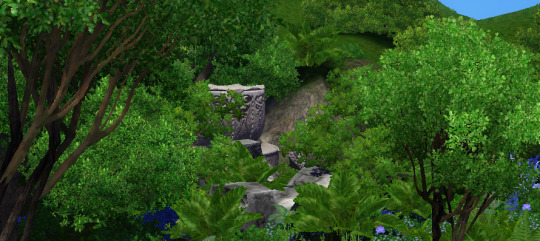
Very little is known about ancient times, when the first Uranesians used to populate the island. Today, all around Uranesia one can find remnants of their civilization, but there’s no trace of them. Who were they? Did their civilization collapse? Or they just left the island? But why leave everything behind? These are some of the questions that the current inhabitants of Uranesia ask themselves. But for now, it’s all still a mystery.
New Uranesians came originally from the Continent. They were an ethnoreligious group known for their industrious spirit and their artistry, and for a long time that made them earn the respect of other groups. However, their misfortune had always been the fact that they were stateless, a minority in other people’s lands. For long they had dreamt of having their own land, a place to call home, something that was reflected in a series of prophecies. Little did they know that one day they would find it in such a far away and remote place.
Over time, political and religious tensions in the Continent arose, and they started being persecuted. Violence against them soon intensified, something terrible was about to happen. Some were seeing it coming so they began preparing some ships to escape, but it happened sooner than expected: they were forced to flee overnight, thousands of people. They rushed to the ships but only a few were able to make it, the rest faced massacre. Those who were luckier set sail for the vast ocean, but they didn’t really have anywhere to go. All they could hope for was a miracle.
After many days on the sea they were running out of food, the ships had been damaged by storms and they had lost the way. They were just drifting in the middle of the ocean. But then they saw it: land in the distance, an island rising steeply from the sea: Uranesia. They ended up at the edge of the known world, in a very remote region that had never really been explored due to its isolation and the belief that it was cursed. To the people in the Continent, the place was almost mythical, only mentioned in some ancient legends. But at that time the soon-to-be New Uranesians didn’t really know where they were.

They landed on the island to rest and recover, people were ill and hungry and the ships were about to fall apart, so they sent small expeditions to get some food and to do some exploring. Soon they realized that the island was rich in natural resources, and it seemed like it was deserted, there was no sign of activity anywhere. It had the potential to become their new home, despite the isolation and the difficult terrain, but it was too soon to make such a decision. So they kept exploring the island, repairing the ships, and started building some dwellings on the coast.
Not long after that they made an important discovery: they found some ancient ruins hidden in the forest, and realized that the island had been previously inhabited. The more they explored the more they discovered, but at first it was only scattered buildings or mysterious structures. One day though, a group of hunters made an amazing discovery that would decide the fate of their people: a lost ruined city nestled between mountains and cliffs, overlooking the sea in various directions. They immediately recognised the strategic value of the place: it was not easy to reach, but it was easy to defend and it had access to fresh water. So they went back and informed the rest of the group about the discovery. It was becoming clearer that Uranesia was a great candidate to become their new home, but they were still prudent. They sent a mission with priests to check out the ruined city, and the veredict was clear. One of the prophecies talked about an eagle on top of a column, and that’s exactly what the priests observed. The prophecy was fulfilled. They decided they would build a new city on top of the ruined one, a place they would call home.

Most of the buildings in the city were too ruined to be reused, but there were many structures they could use as a base and a lot of stone to use for the new buildings. Besides that, there was a lot of stuff from the ancients, it wasn’t just stone and building materials. As they were building the new city the New Uranesians spent a long time studying everything the ancients left. They realized their civilization was quite advanced, and there was so much they could learn from their culture. However, the ruined state of everything and the fact that they couldn’t understand the ancient scripts made it difficult. Because of that, in the end the ancient’s influence reflected mostly in practical aspects they could learn from observation, such as building and art techniques. Yet, they did manage to decipher their writing system, which the New Uranesians ended up adopting, as well as a few words from the language of the Ancients which they incorporated into their vocabulary. However, essential questions about who they were and why they dissapeared are still a mystery. (In the picture below, some structures from the Ancients are still standing today in the city).

Slowly but steadily they were creating a new city and a new society, despite being such a small group. They introduced agriculture, metalwork, internal trade, power structures, basic services, etc. Everybody had a role and things were starting to work out. Uranesia’s natural resources, their industrious spirit, their unity and their very strong religiosity played a key role in their survival and development. Eventually, though, they reached a point where, if they wanted their civilization to really thrive and flourish, if they wanted to become stronger, what the island provided was not enough. They couldn’t remain isolated forever, there was a world out there bigger than their city in their remote island. They had been unnoticed for a very long time, there was stability, and they knew that the conflicts in the outside world could threaten them again. Moreover, they still remembered the tragedy that forced them to flee from the Continent very well, centuries after. But they also knew somebody else could land on the island any day at any time, and at that time they were not strong enough to defend themselves.
That’s when they started fortifying the city and setting foreign trade expeditions, they had a lot of unique stuff to offer from the island but there was also so much they needed from the outside world. Eventually, they came upon a trading island in the middle of the ocean, a place owned by free merchants and used as an international commercial center. That offered them the possibility to take their products there, trade with merchants from many different lands, and go back to Uranesia keeping a relative secrecy. They couldn’t keep the island 100% a secret, but they made sure all the trade happened outside the island, even though they started allowing some visits from important merchants to Uranesia, normally to the port area only, and very rarely to the upper city.
Trade became very important for their society, and thanks to it they became richer and more developed. During that time they expanded the city down to the sea, they built a port, and they created a system of canals and locks to make the transportation of goods easier.
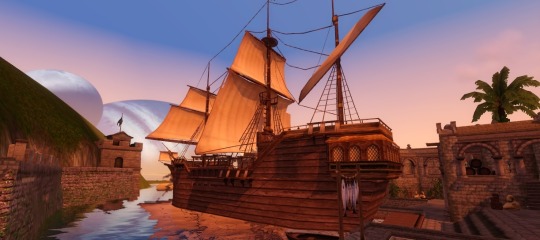
For years things were calm and stable, but a few years ago everything changed. Stories about a far away island with lots of riches spread, and one of their worst fears came true: a group of pirates reached the island. Their first contact was quite unfortunate and aggressive, the clash was inevitable, so that led to an attack of the Pirates to the Uranesians’ weakest site: a temple by the sea, where they first landed many centuries ago. The Uranesians couldn’t repel the attack and were forced to withdraw to the city. After that, they improved the fortifications of the city and the port, even blocking some of the ways into their domain, to prevent further potential attacks.

After their small but significant conquest, the Pirates decided to stay on the island and they built a settlement next to the raided temple. They created some sort of small colony, where they load their ships with goods from the island to sell around. That’s where they live and they have no plans to leave.
Apart from the attack on the temple, there have been no more hostilities, but tensions are still very strong. At this point no group has the power to attack the other and succeed, so there is a relative stability and a sense of fake peace. So the current panorama is an island divided in two communities who live parallel lives and seem like they ignore each other, but violence could erupt easily again if that changes.
But let’s not forget a third element in the island: the wild areas. Uranesians might have reached distant lands and explored beyond the island, but surprisingly, there are some parts of the island that are still unexplored. Either by a lack of interest or need, because of the belief that these areas are populated by evil spirits or are cursed, or because getting there seems impossible or too dangerous due to the difficult terrain. In any case, nobody really knows about the secrets that these areas might hide, and someone will have to be the first one to discover them.

And this is the current situation that I’m representing in CAW. If you’re still reading, thanks for bearing with me! That was a long text haha
You can read the first version of the history of Uranesia that I posted for World Building June two years ago HERE, but pretty much everything has changed. One year ago I posted a newer version of the history (HERE), which is more or less the same I explain here, but with small changes. So this one is the valid one.
I hope you found it interesting and enjoyed reading it :)
98 notes
·
View notes
Text
How Technology Advancements Has Its Impact on Us
The headway of new innovation has been occurring since the start of mankind's set of experiences. From the creation of things like the lance and blades made out of rocks and sticks to help with the catching and killing of creatures for food, to things like the primary print machine and the PC. The inquiry: are the effects positive or negative?

Innovation is a word used to by and large depict or depict the headways, abilities,creations, endeavors, perspectives, and information on a particular gathering of people: we as mankind. The headway in innovation has been particularly quick in the twentieth and 21st century. With electronic innovation and machines being delivered and worked on constantly, almost certainly, alongside the positive parts of these new headways, individuals would likewise think about the negative viewpoints and hope to censure new innovation.
A Positive Side
As the advanced age states "Need IS THE MOTHER OF INVENTION" for example necessities will in general generate innovations and every development is attached with the need of improvement and alteration. More up to date and fresher advances are occurring continuously. Innovative change is in huge part answerable for a considerable lot of the common patterns in such fundamental boundaries of the human condition as the size of the total populace, future, schooling levels, material norms of living,and the idea of work, correspondence, medical care, war, and the impacts of human exercises on the regular habitat.
Different parts of society and our singular lives are likewise affected by innovation in many immediate and backhanded manners, including governance,entertainment, human connections, and our perspectives on ethical quality, brain, matter, and our own human instinct. Unnecessary to add that these headways likewise fortify financial advancement as the powerful utilization of innovation lessens the material creation cost and the overhead charges which produce reserve funds in the economy and accordingly lead to public turn of events.
What's more, the Negative Side
Issues and possibilities frequently go connected at the hip; Society has become increasingly more reliant upon innovation. To such an extent that we now and then come up short on the ability to think before we act. We become restless on the off chance that it takes in excess of a couple of moments to download a duplicate of the morning news paper. We anticipate that immediate responses should our email, and we anticipate that someone should answer their phone at whatever point and any place we call.
Innovation is making us so bust that we can can't figure out how to go through with our shut one's. it is astonishing to realize that individuals are in touch through talk and internet informing however they are in same city since they think its all the more quicker and viable yet they are failing to remember that gathering by and by can never supplant web based visiting.
"innovation in aggregate, is both companion and foe"
Neil Postman, writer of the book called Technopoly, composes that 'innovation in total, is both companion and foe'. He can see the advantages and how innovation can be viewed as a companion to humankind that 'it makes life simpler, cleaner and more'. He can acknowledge it does mankind great. It's just about a positive case dependent on innovation like clinical headways like x-beam gadgets and clinical medications that assistance to extend life and help humankind. This is an extremely sure part of the headway since we can further develop wellbeing and stretch our lives. However, these clinical headways are essentially created by organizations, who then, at that point decide to adapt the progression. Moral obligation is debilitated by this covetousness for cash; they have lost the target in saving lives or making individuals sound once more. They are just making headways in innovation to rake in boatloads of cash.
Neil Postman additionally considers innovation to be subverting human cycles also. That innovation makes 'a culture without moral establishment' and subverts social relations between people. This can presently be seen with the contention over long range informal communication destinations on the web. It was made for individuals to convey and arrange, yet certain individuals use it as their main type of correspondence with others. This doesn't really help their social abilities in the genuine and outside world away from the web. Individuals can become dependent and dependent on this innovation and use it as their fundamental structure for making social relations. It makes things like understanding looks and non-verbal communication difficult to get a handle on.
Conclusion
In the event that mechanical progressions are placed in the best uses, it further motivates the advancement in related and non-related regions and yet its negative use can make devastation in the mankind or the world. Innovation has, and will, change the ethical texture of humankind; it is dependent upon the current age to notice this notice and not permit such cultural tragedies of massive extents at any point to happen again Technological Advancements will keep on progressing quickly as we move into the following thousand years. What is significant is to guarantee that these advances advantage humankind in general...
0 notes